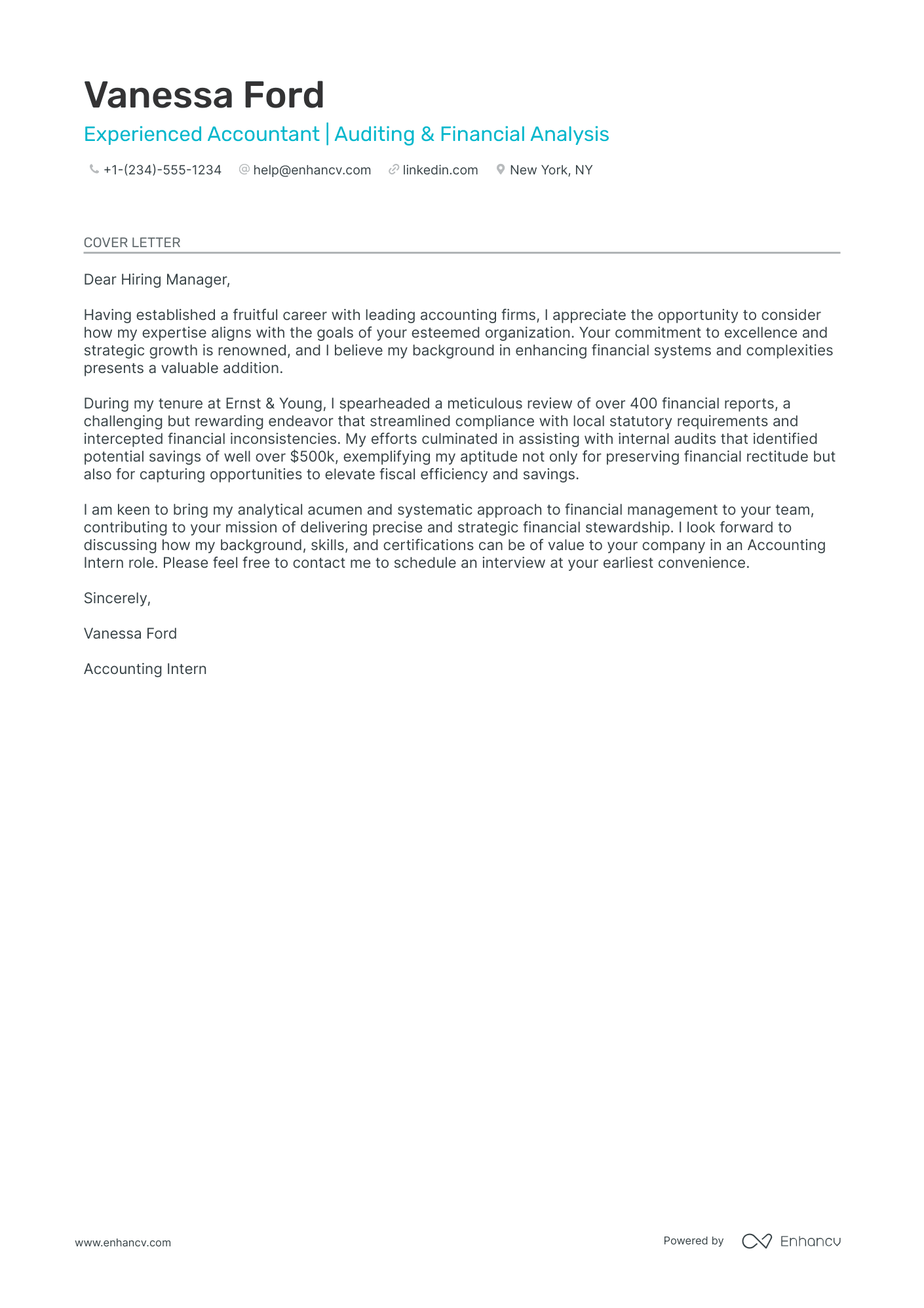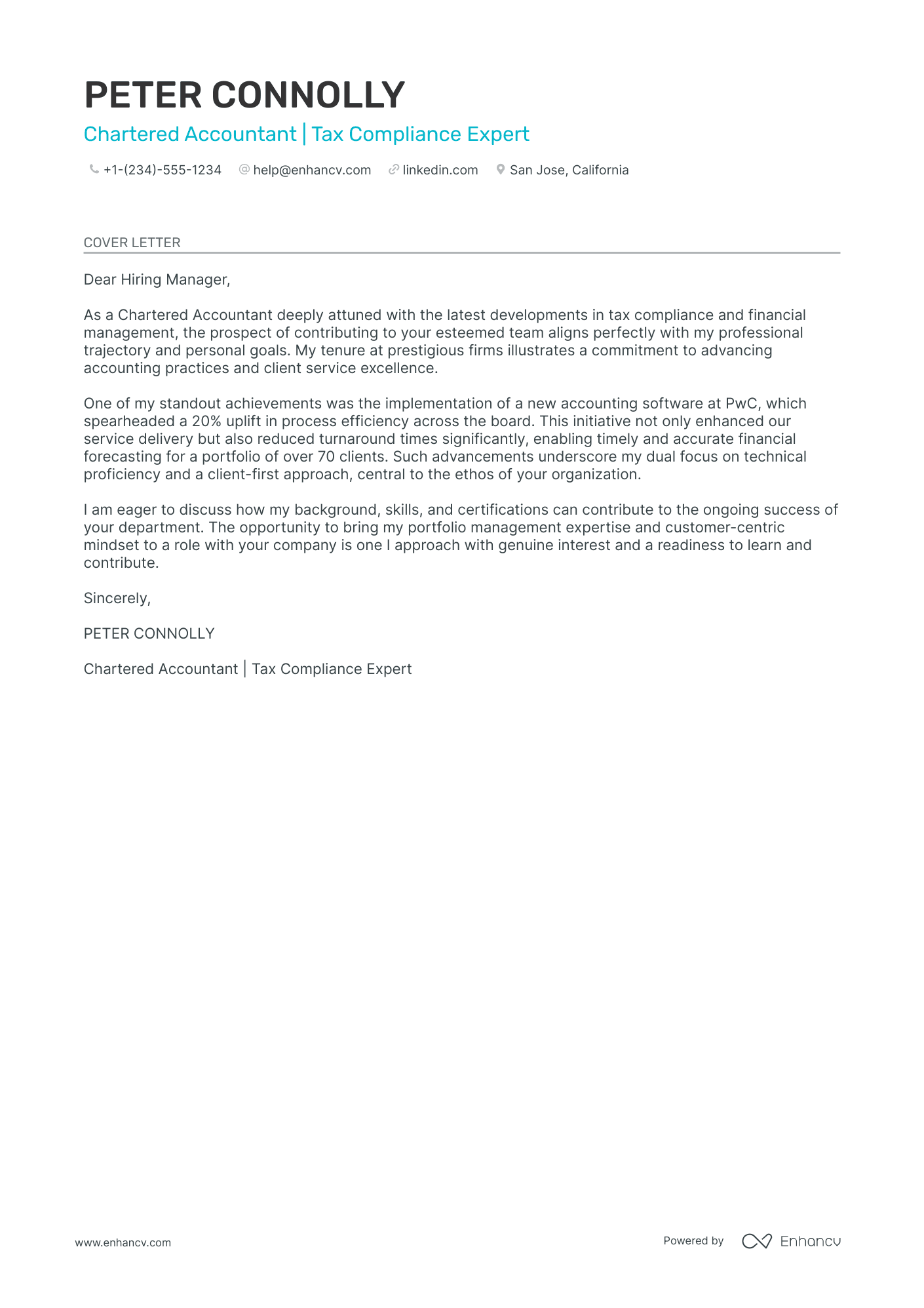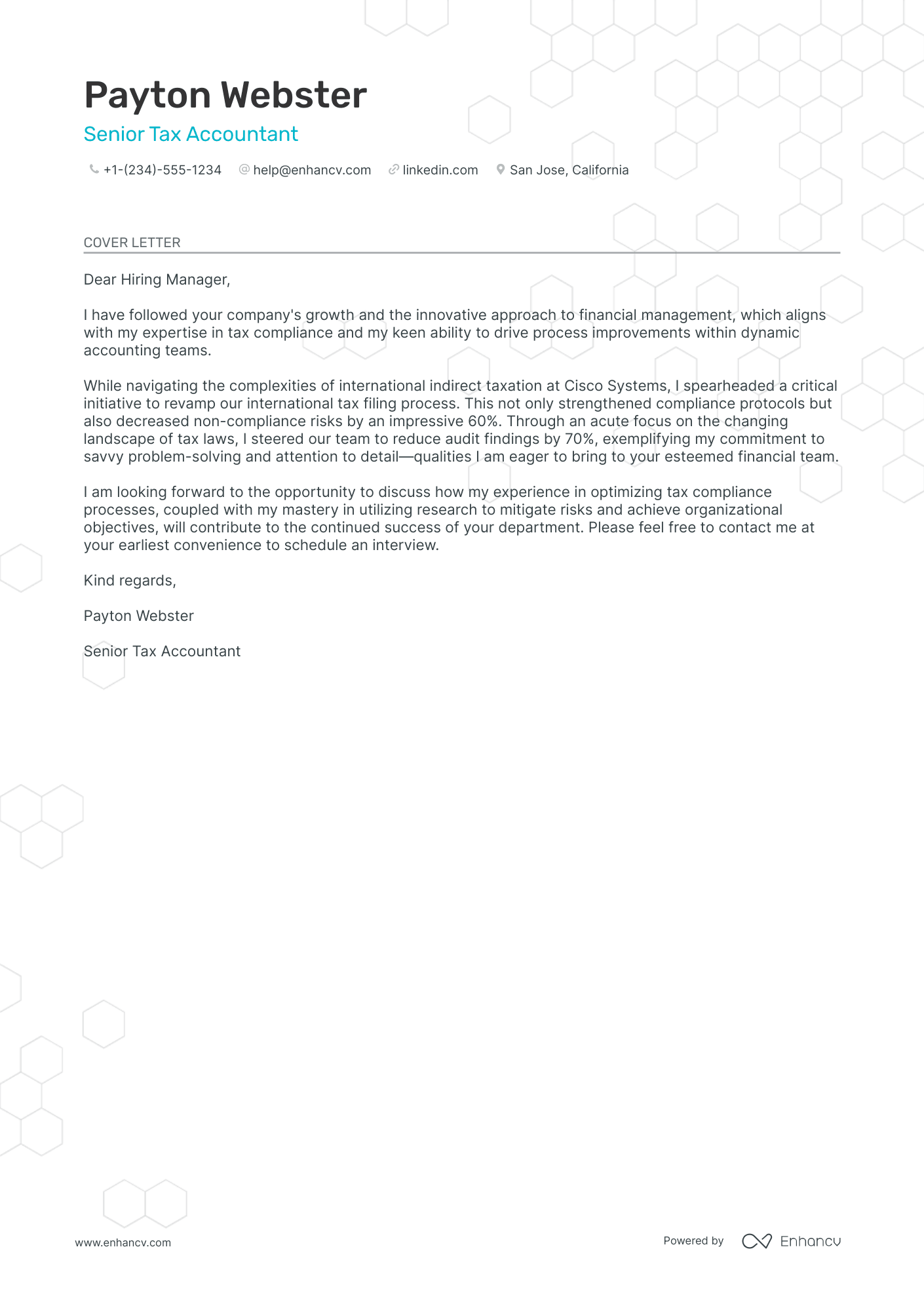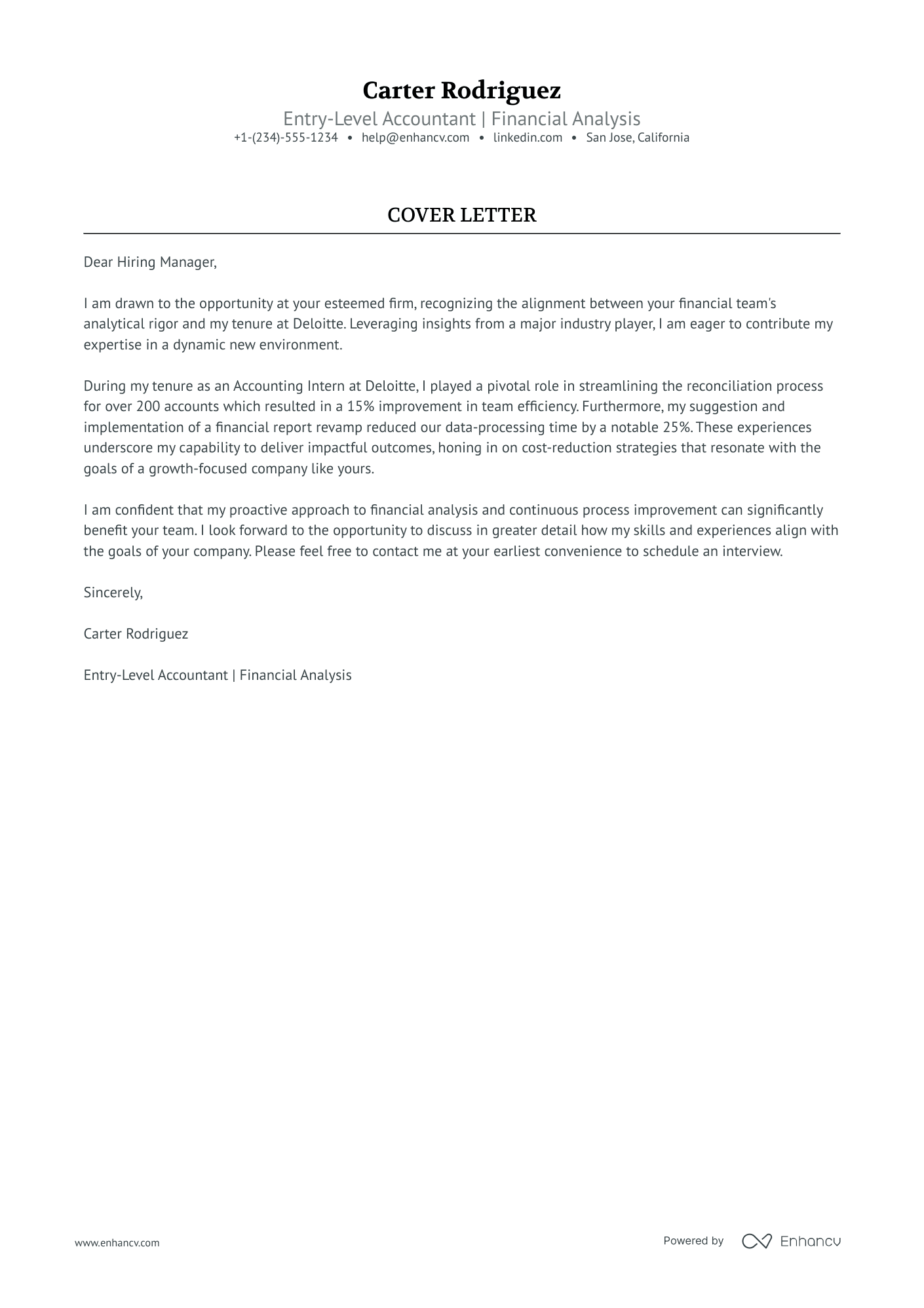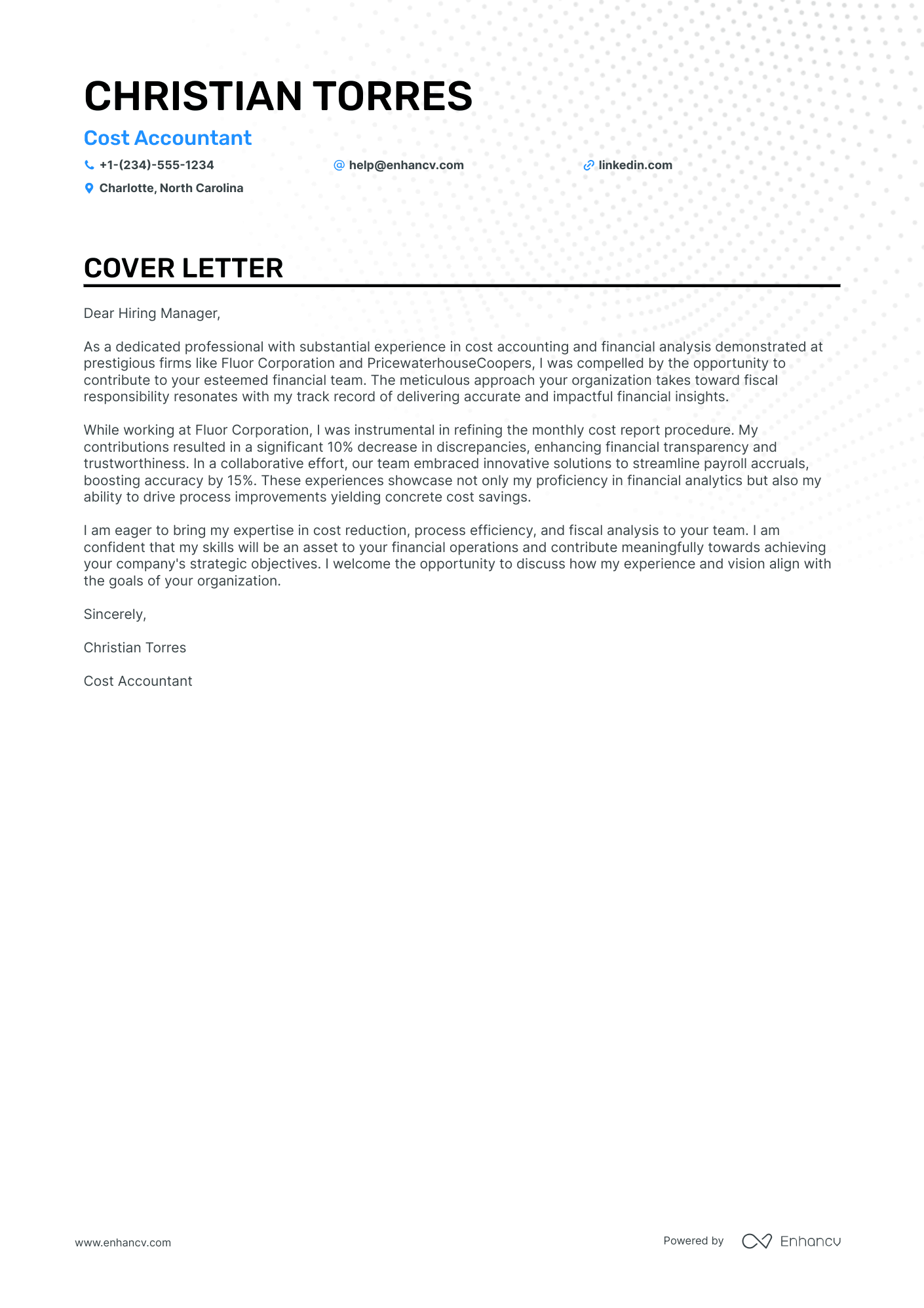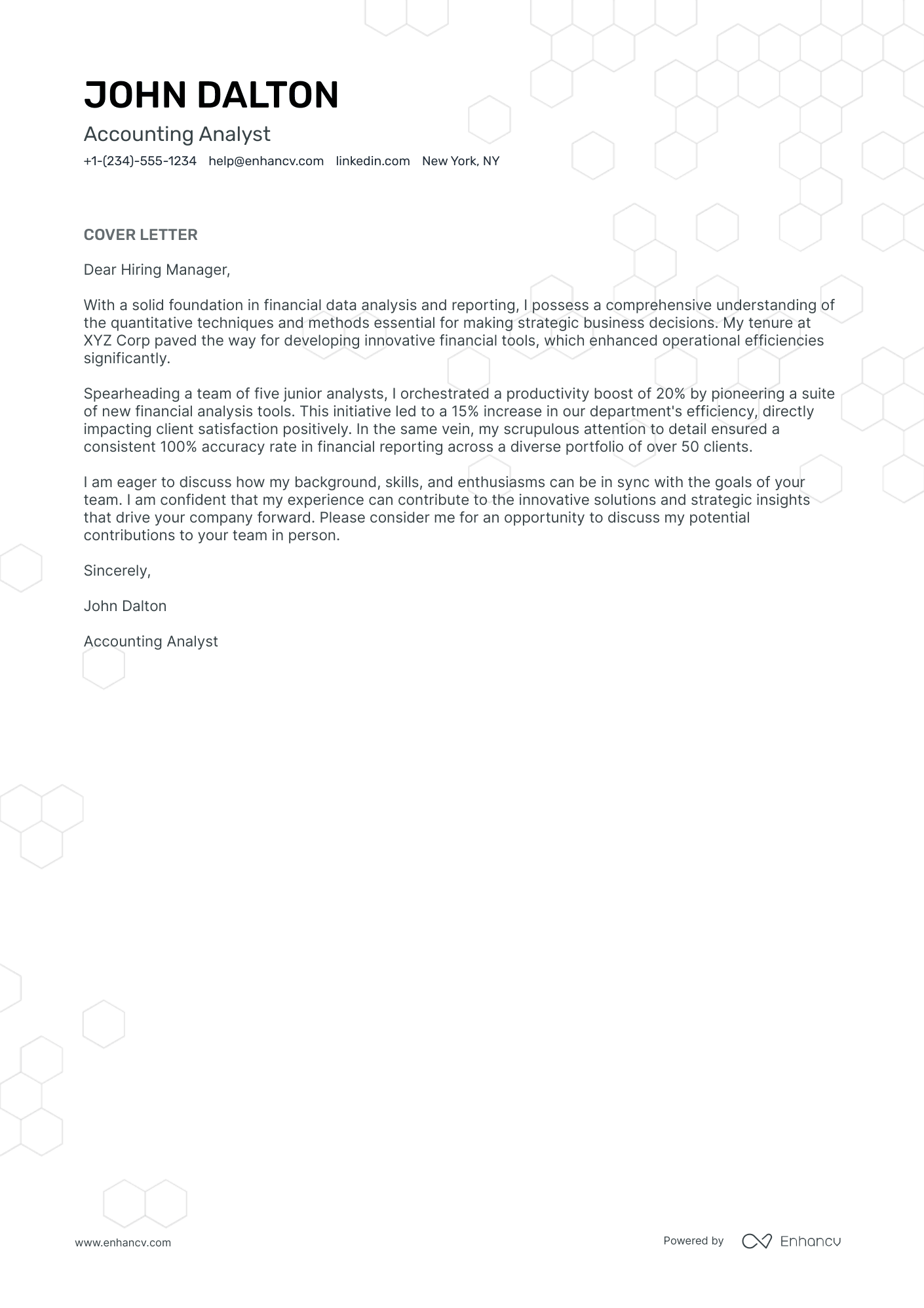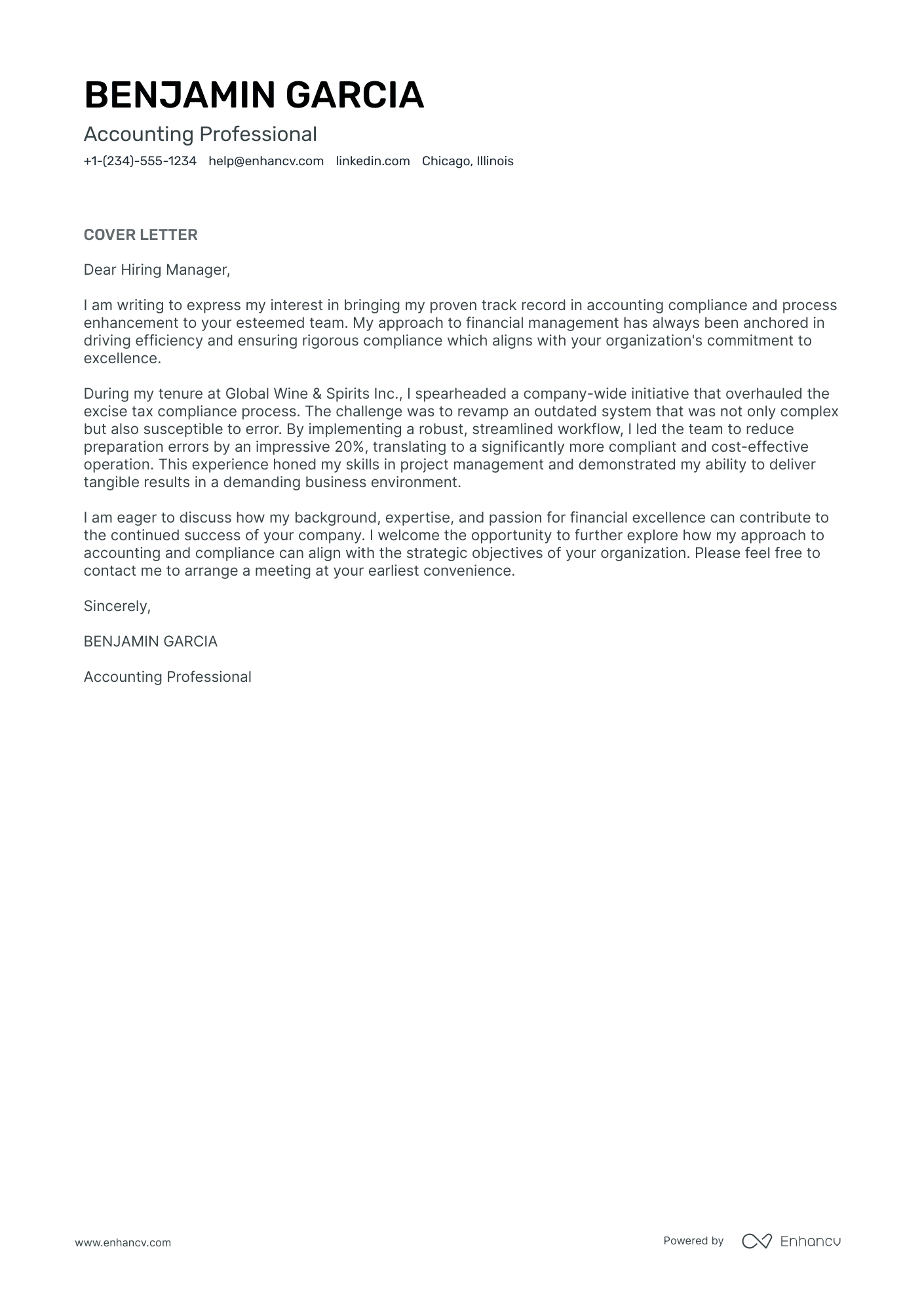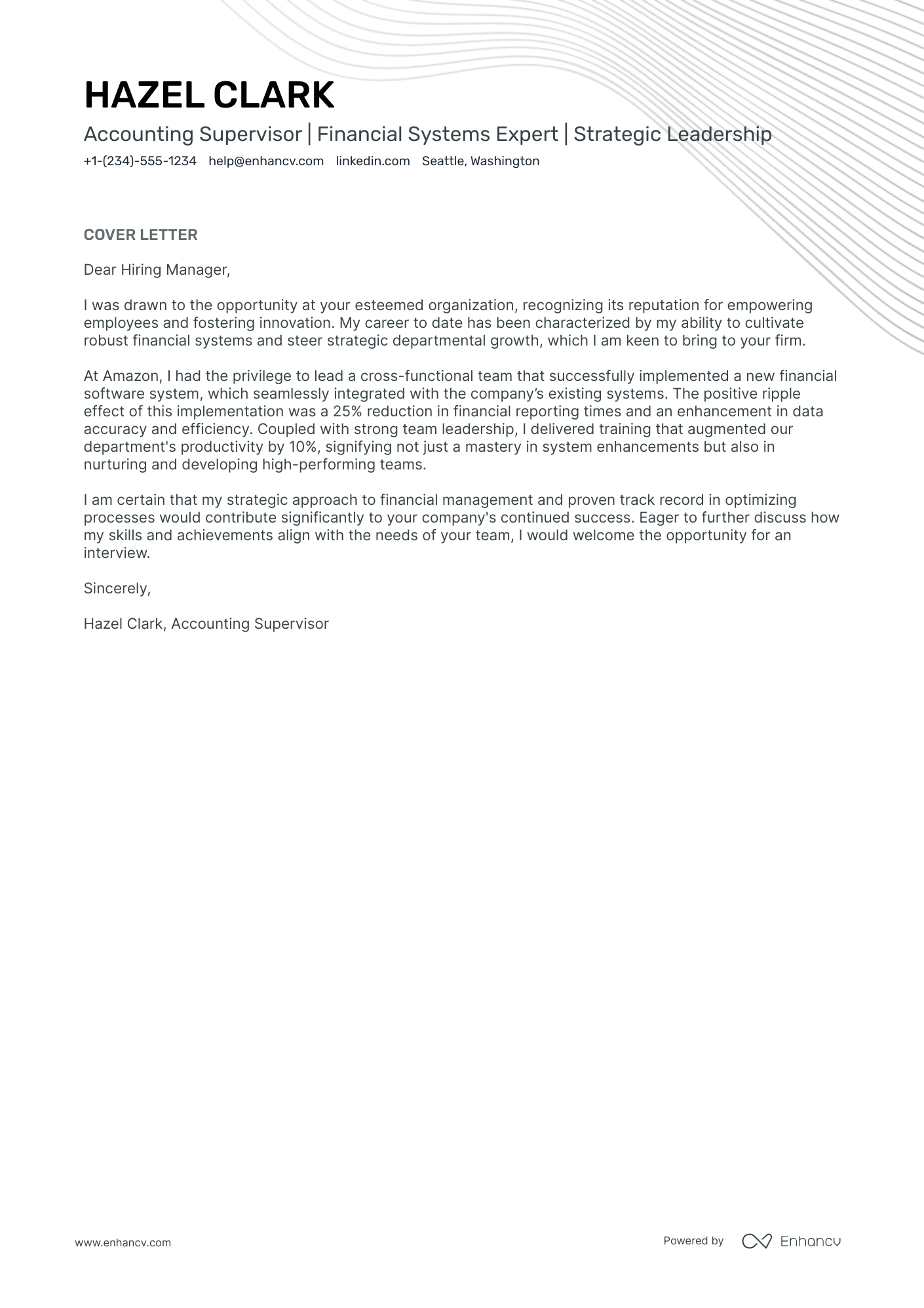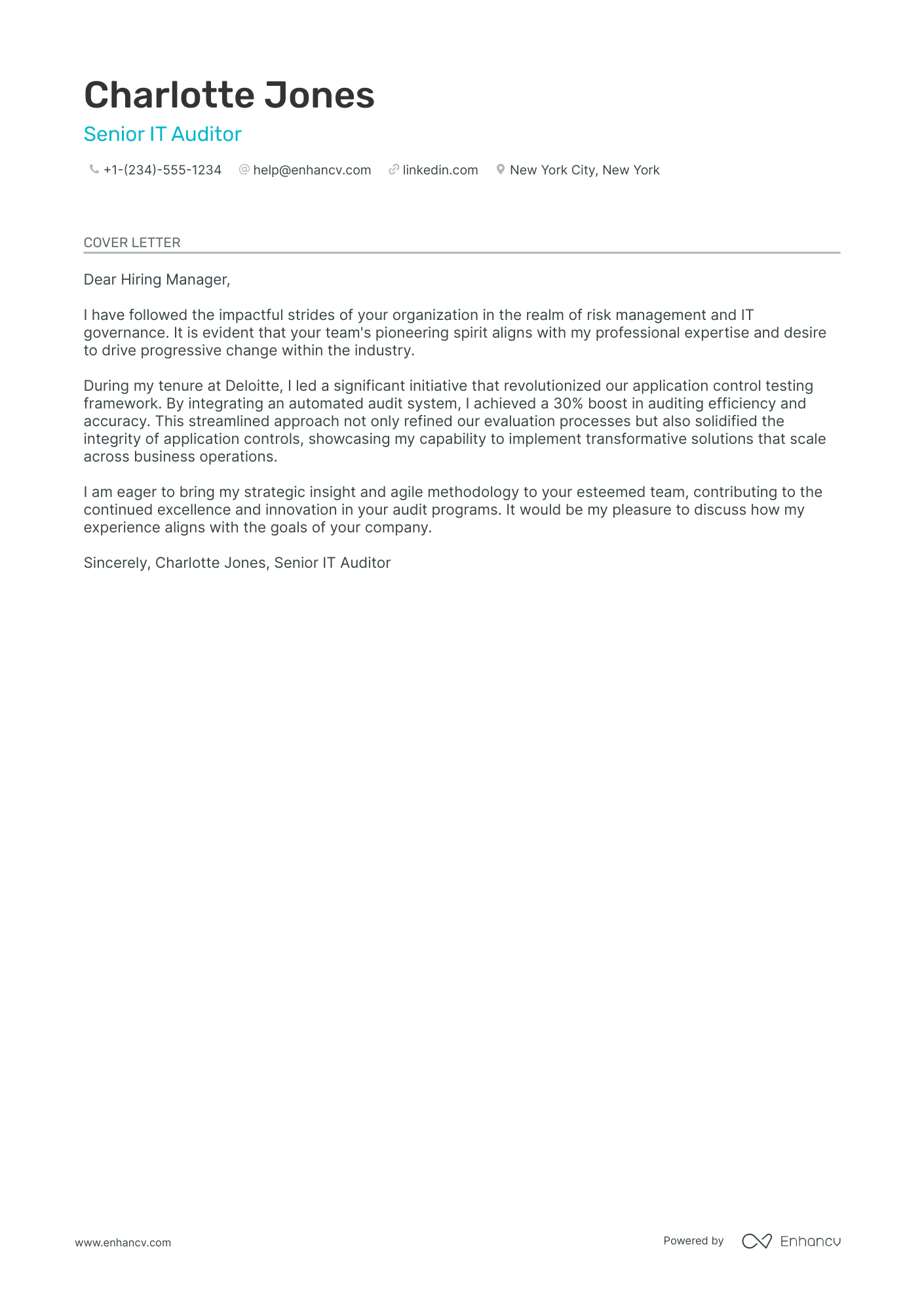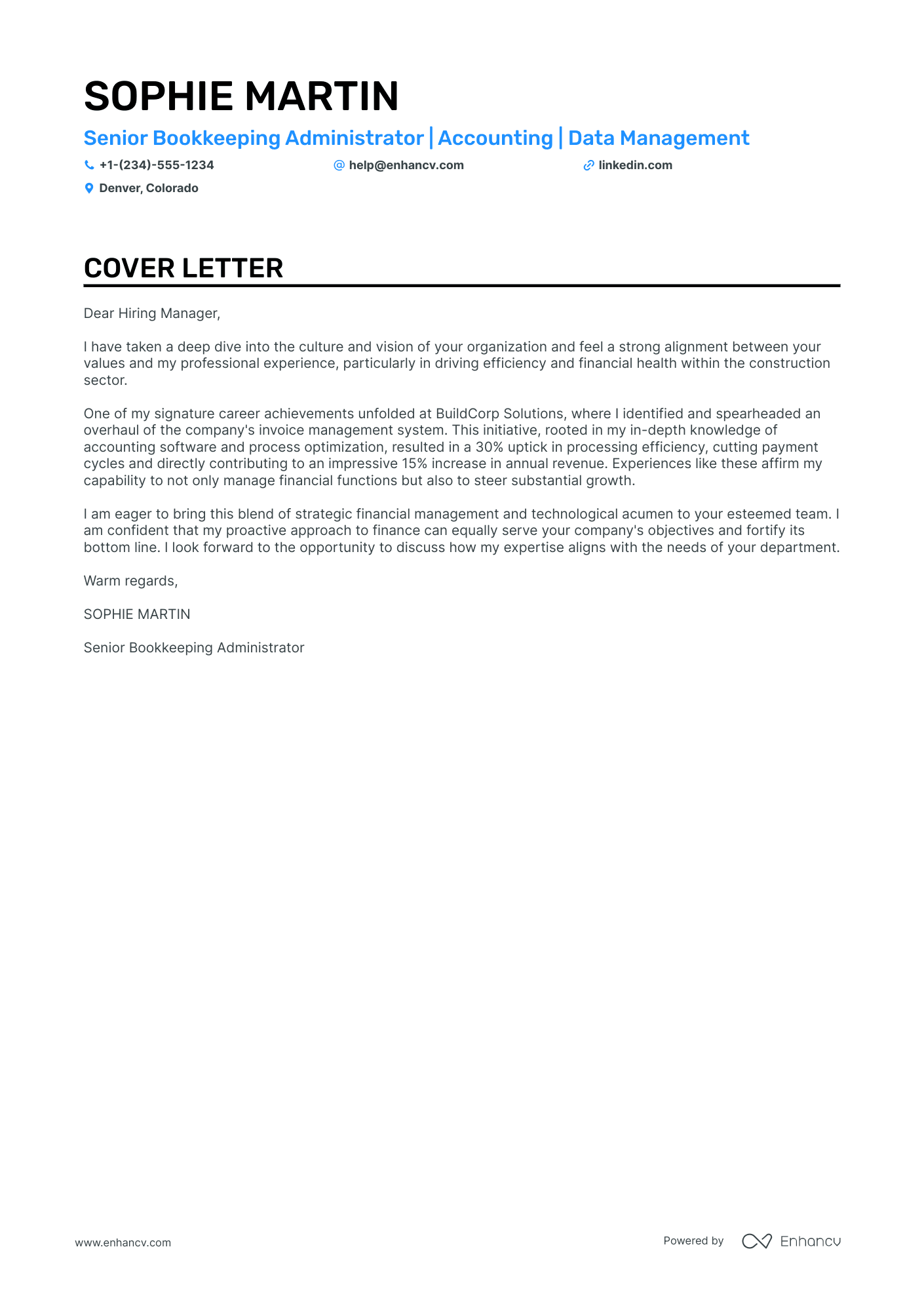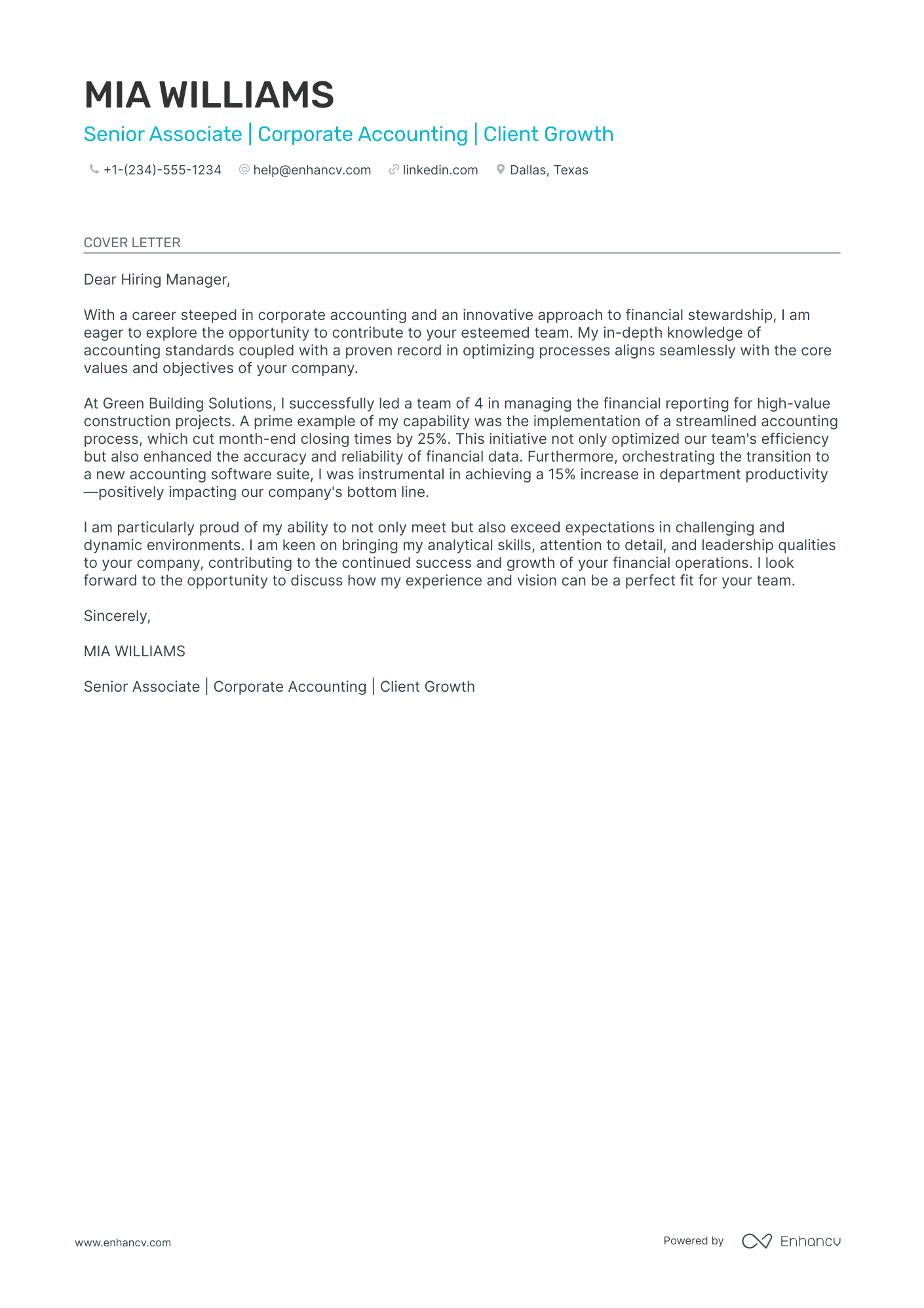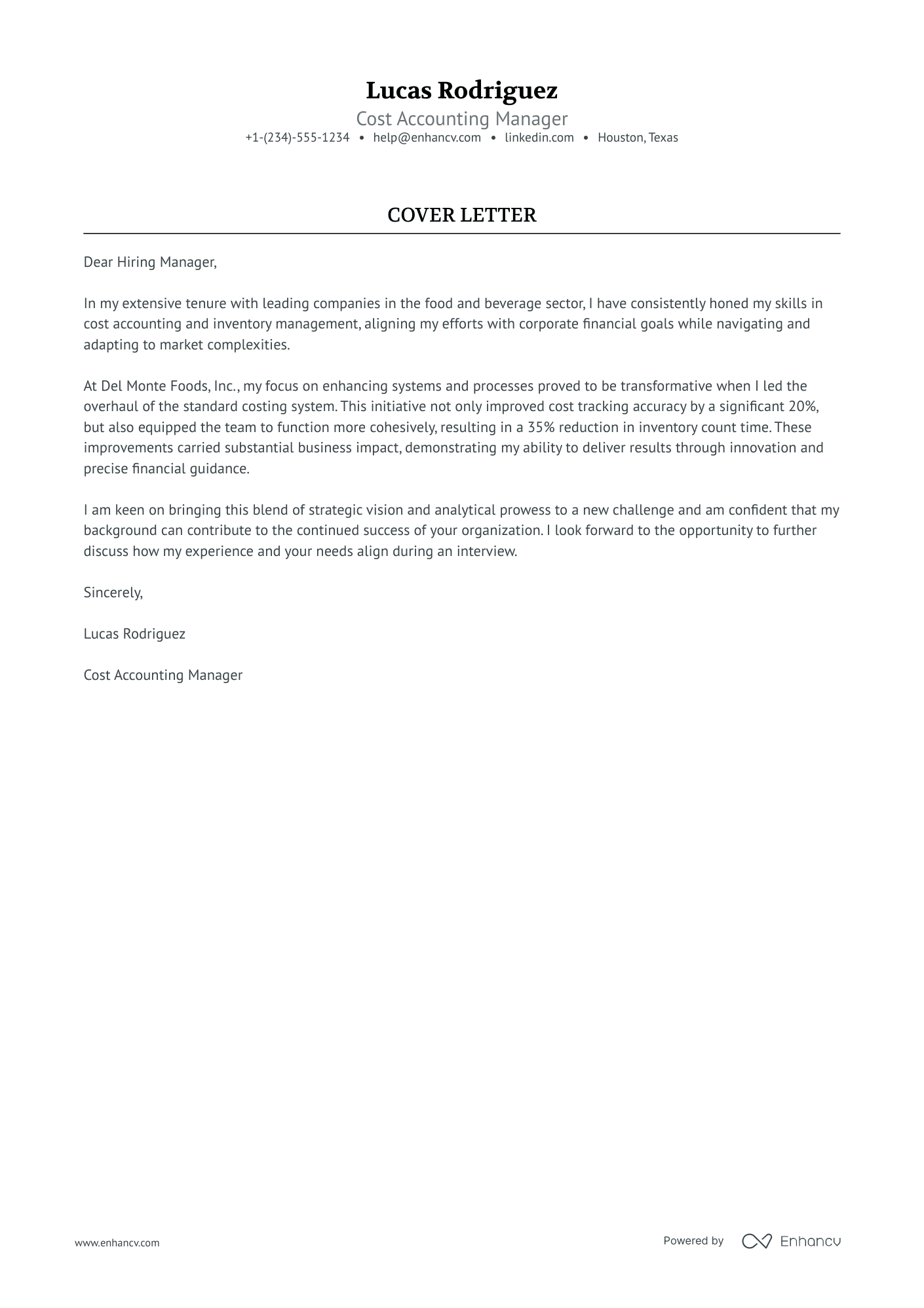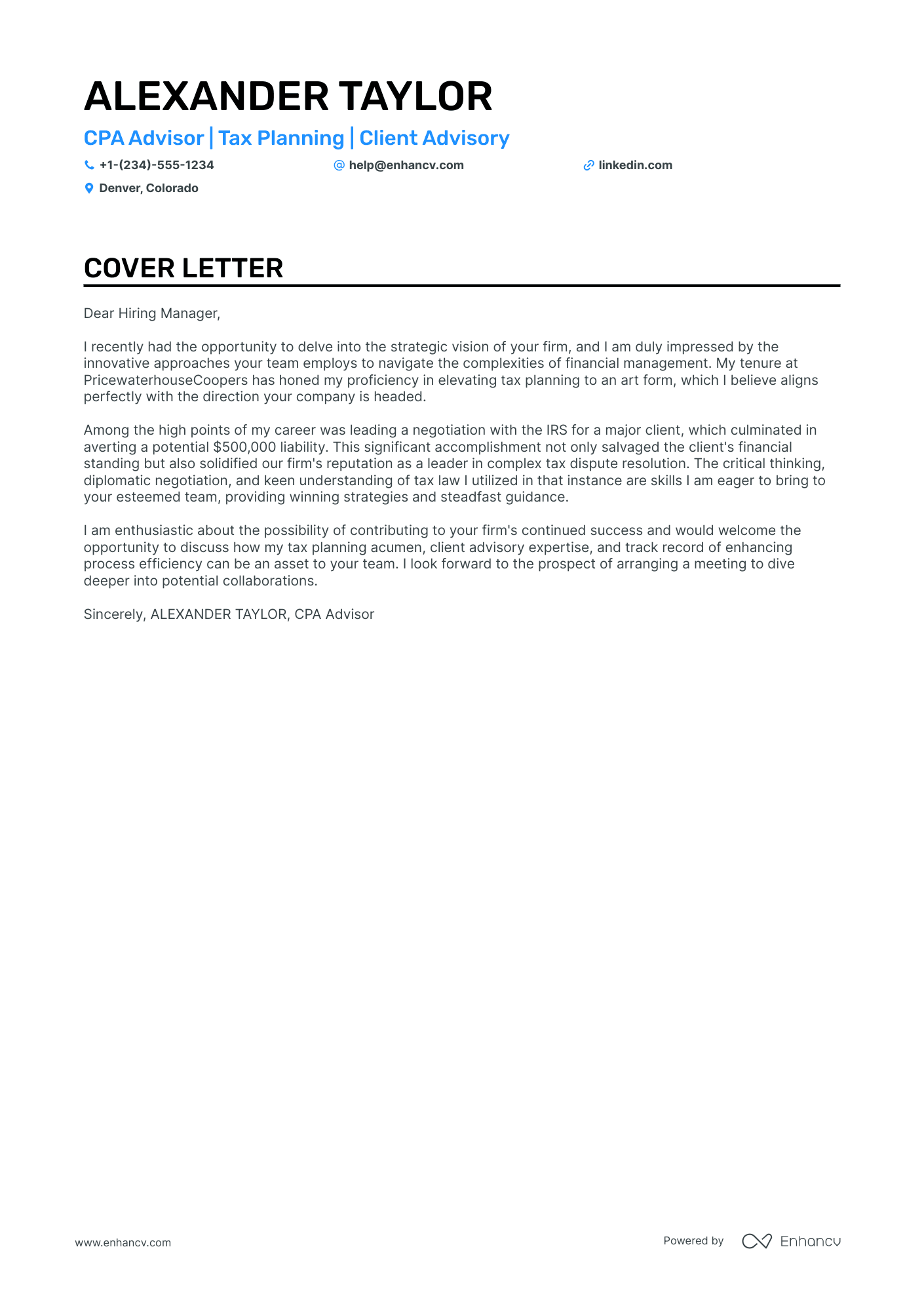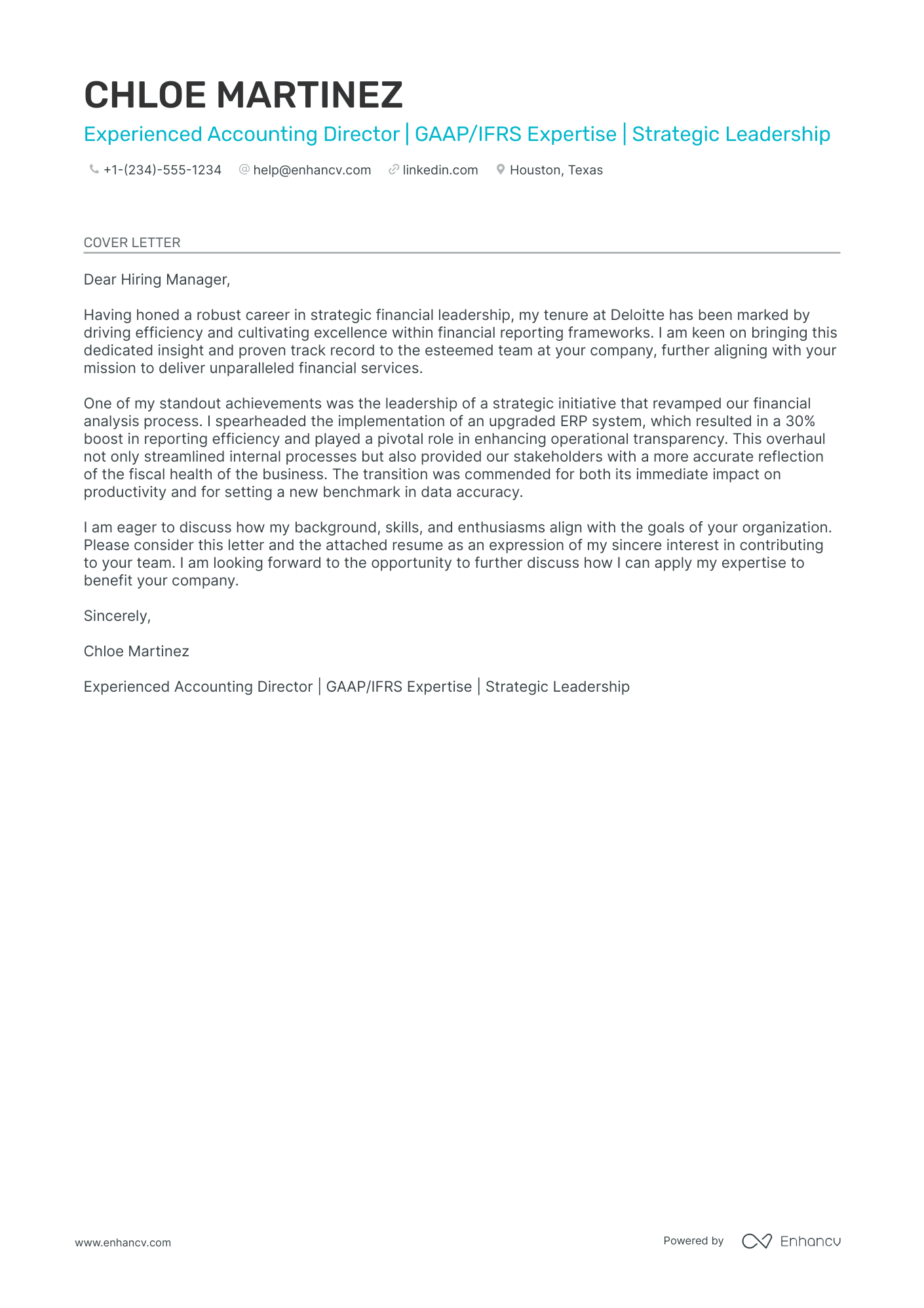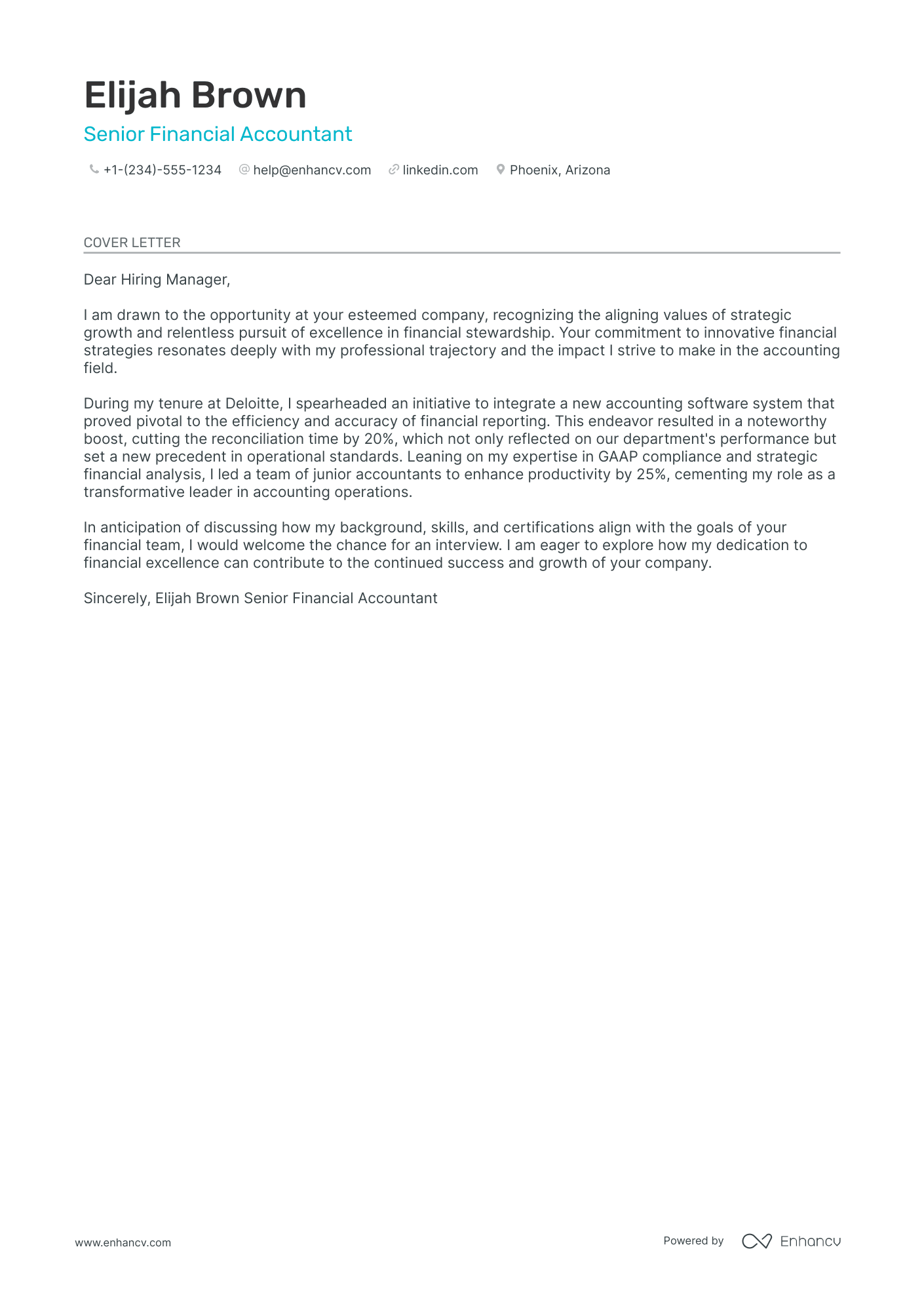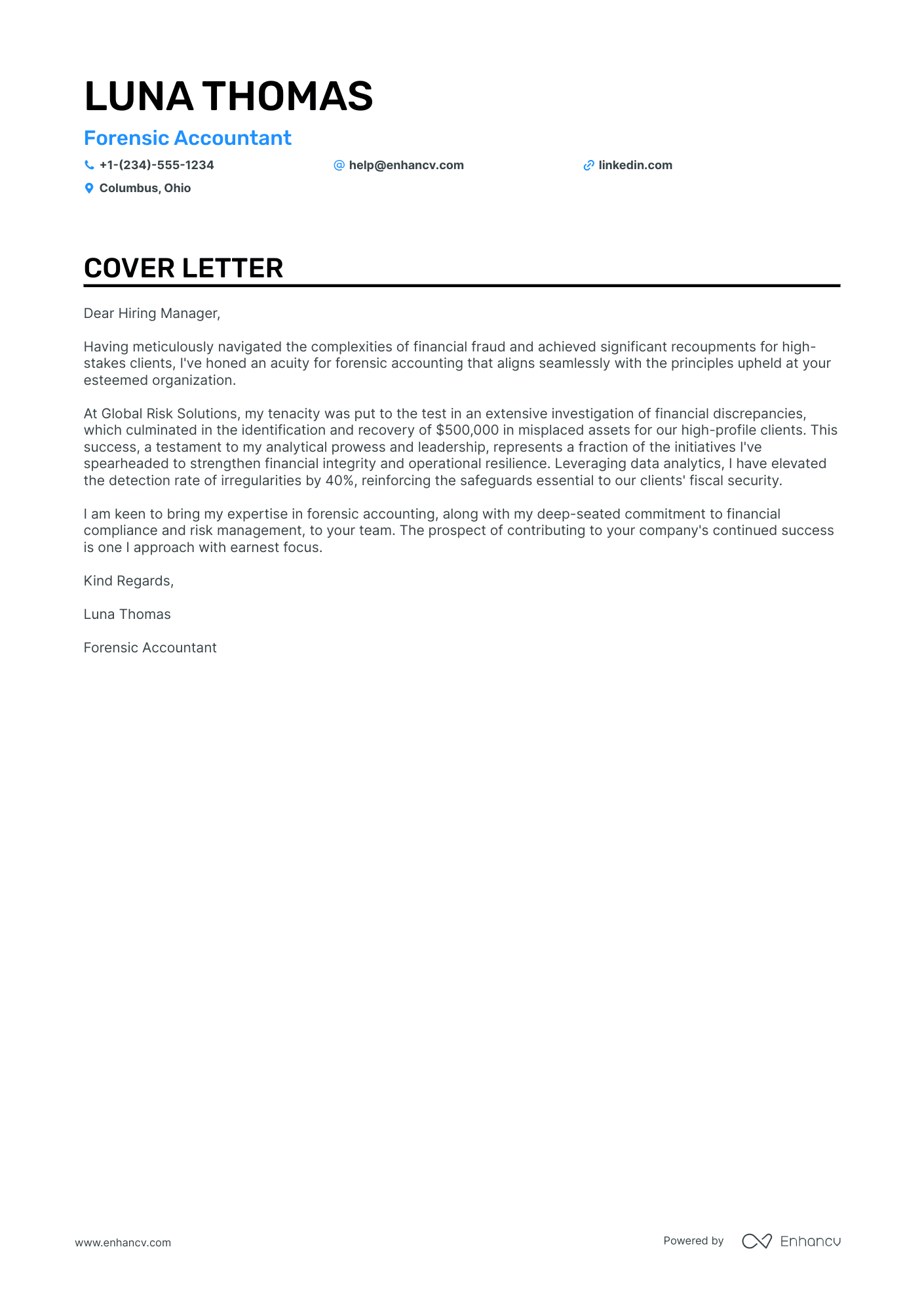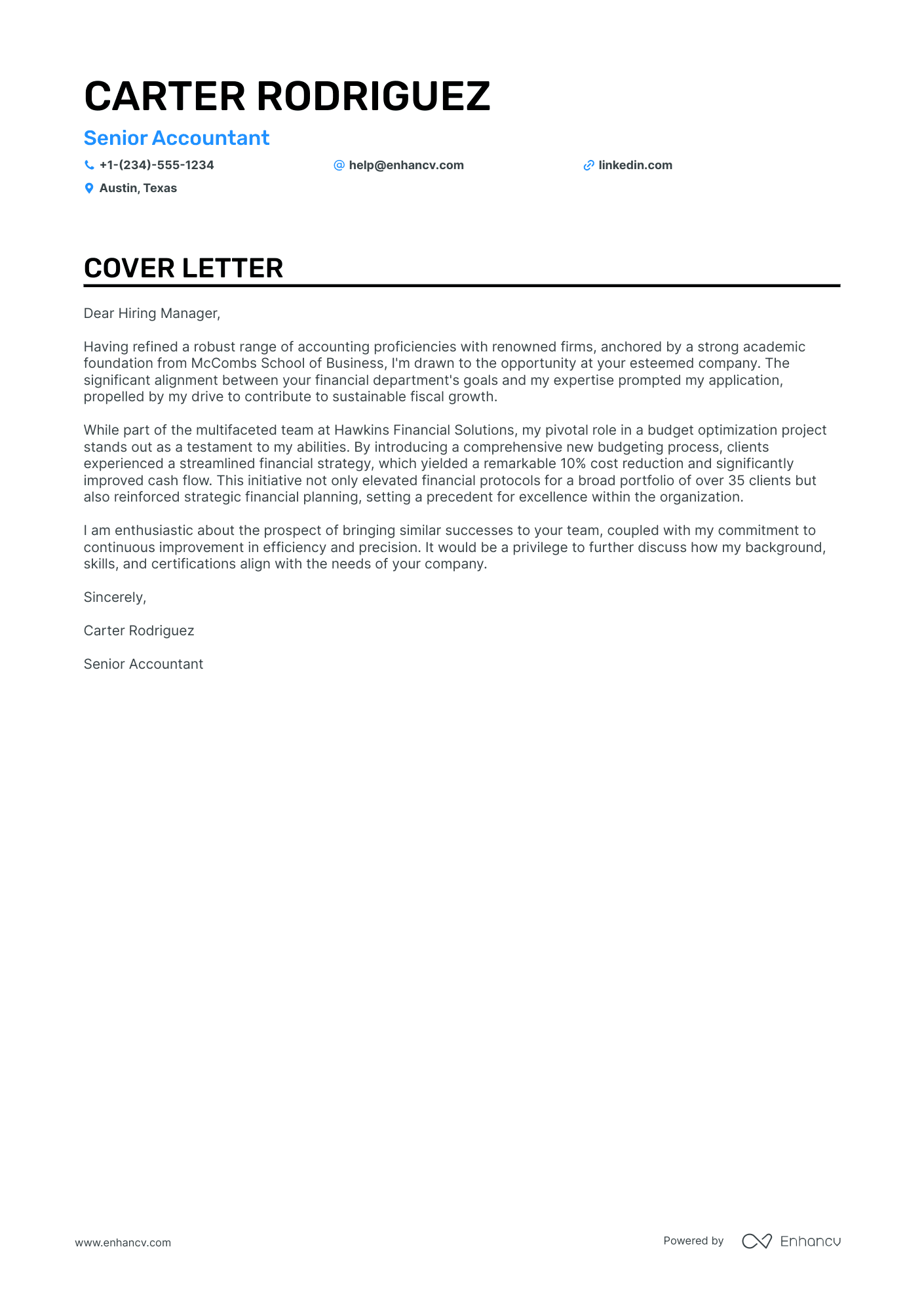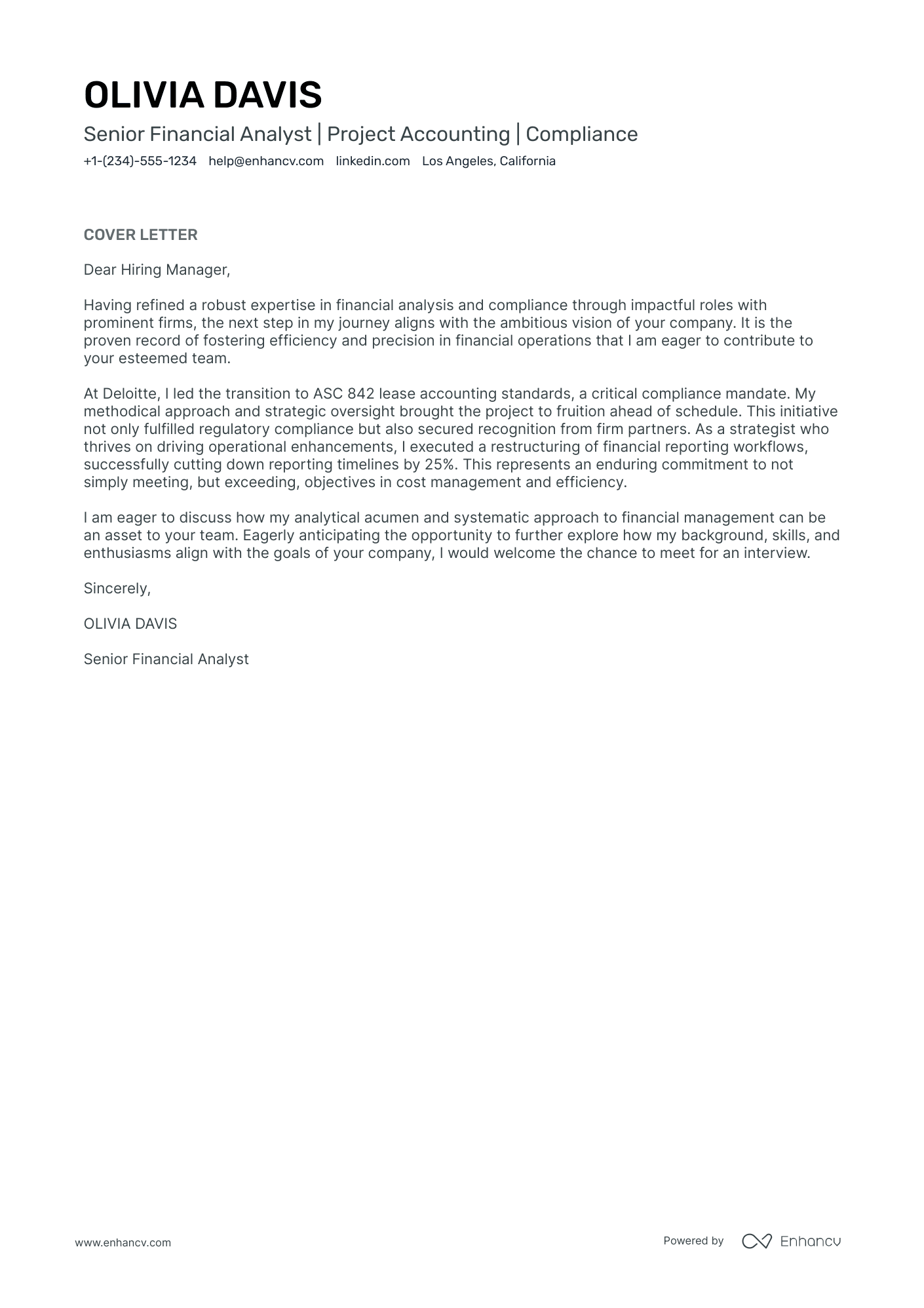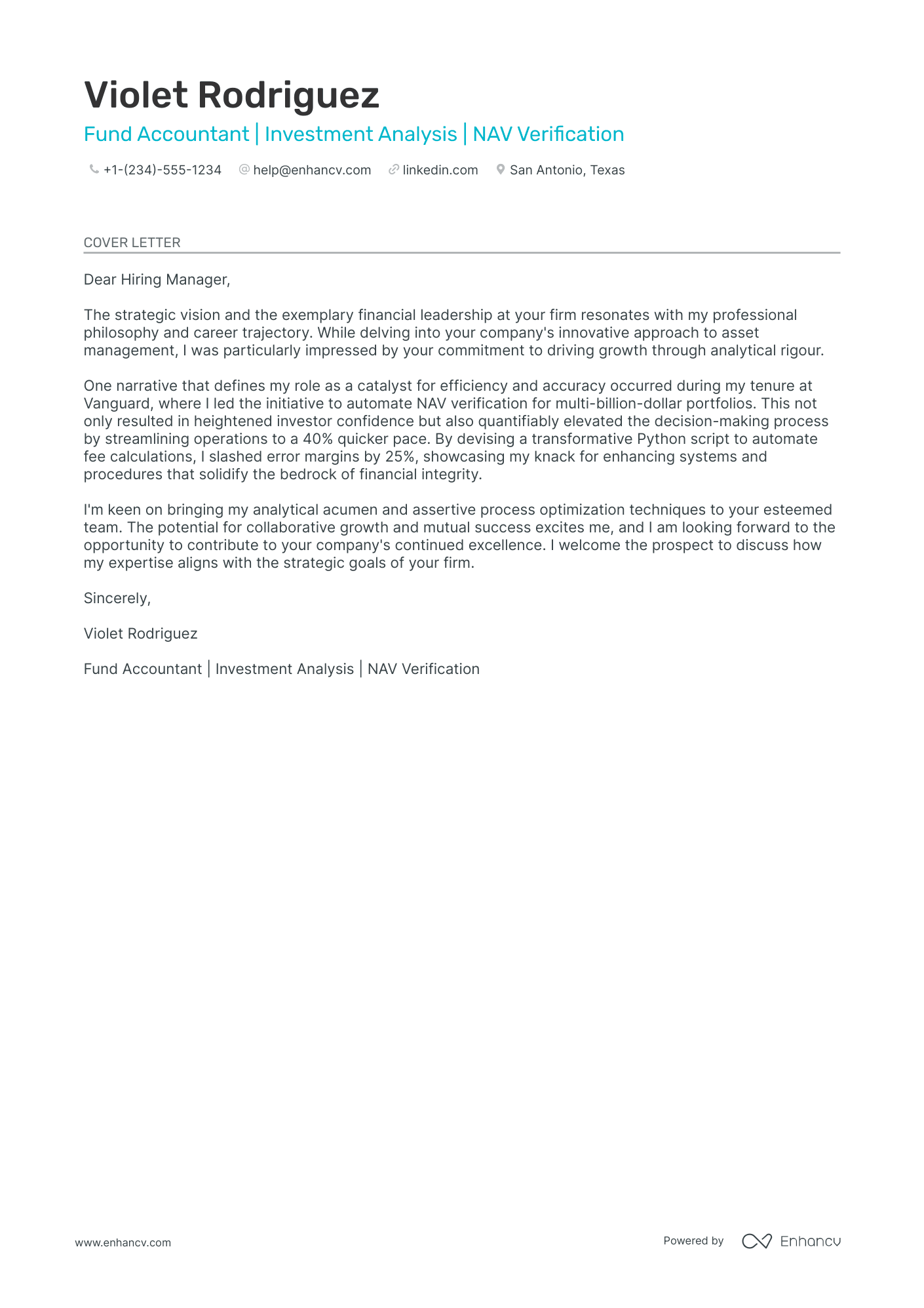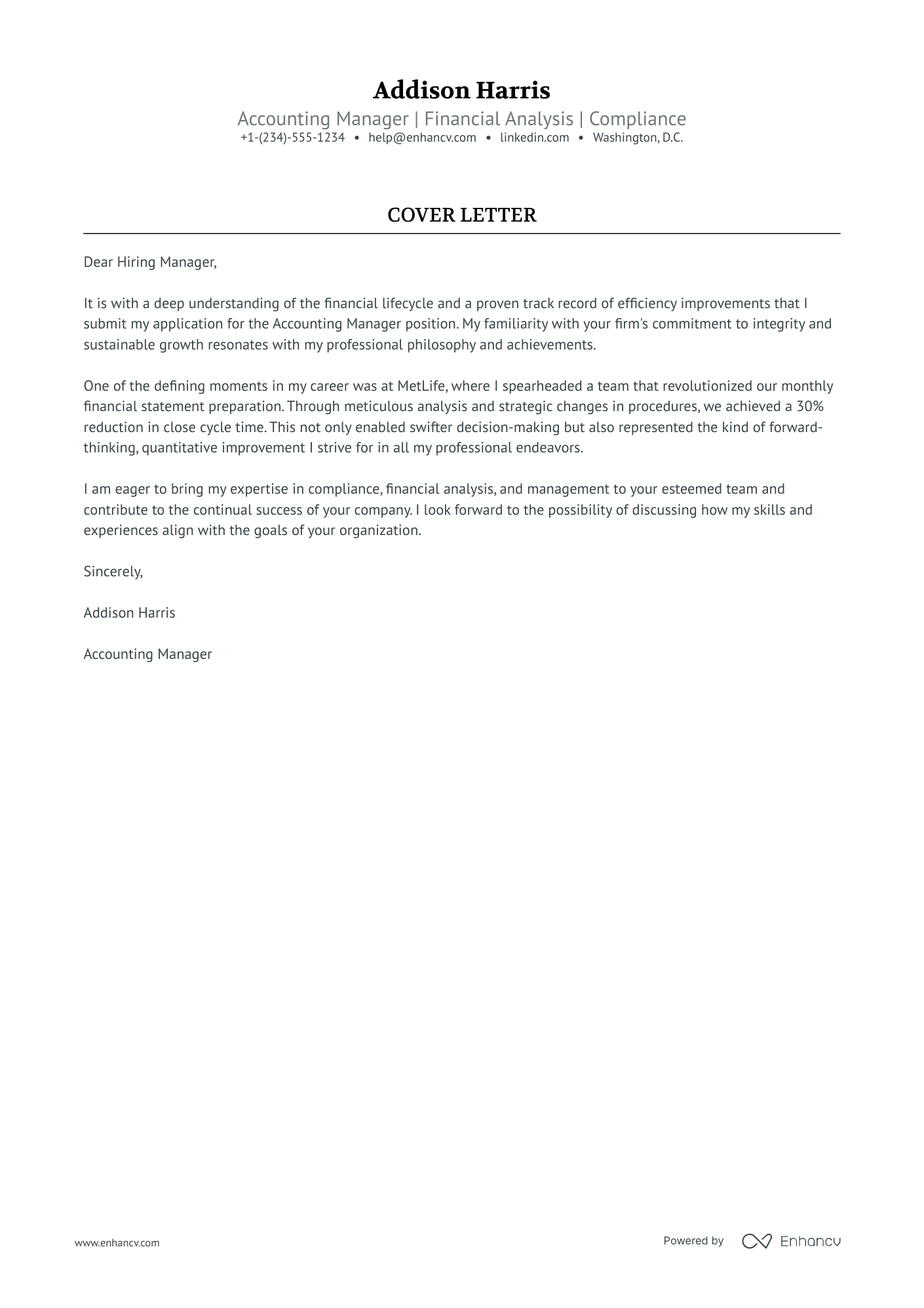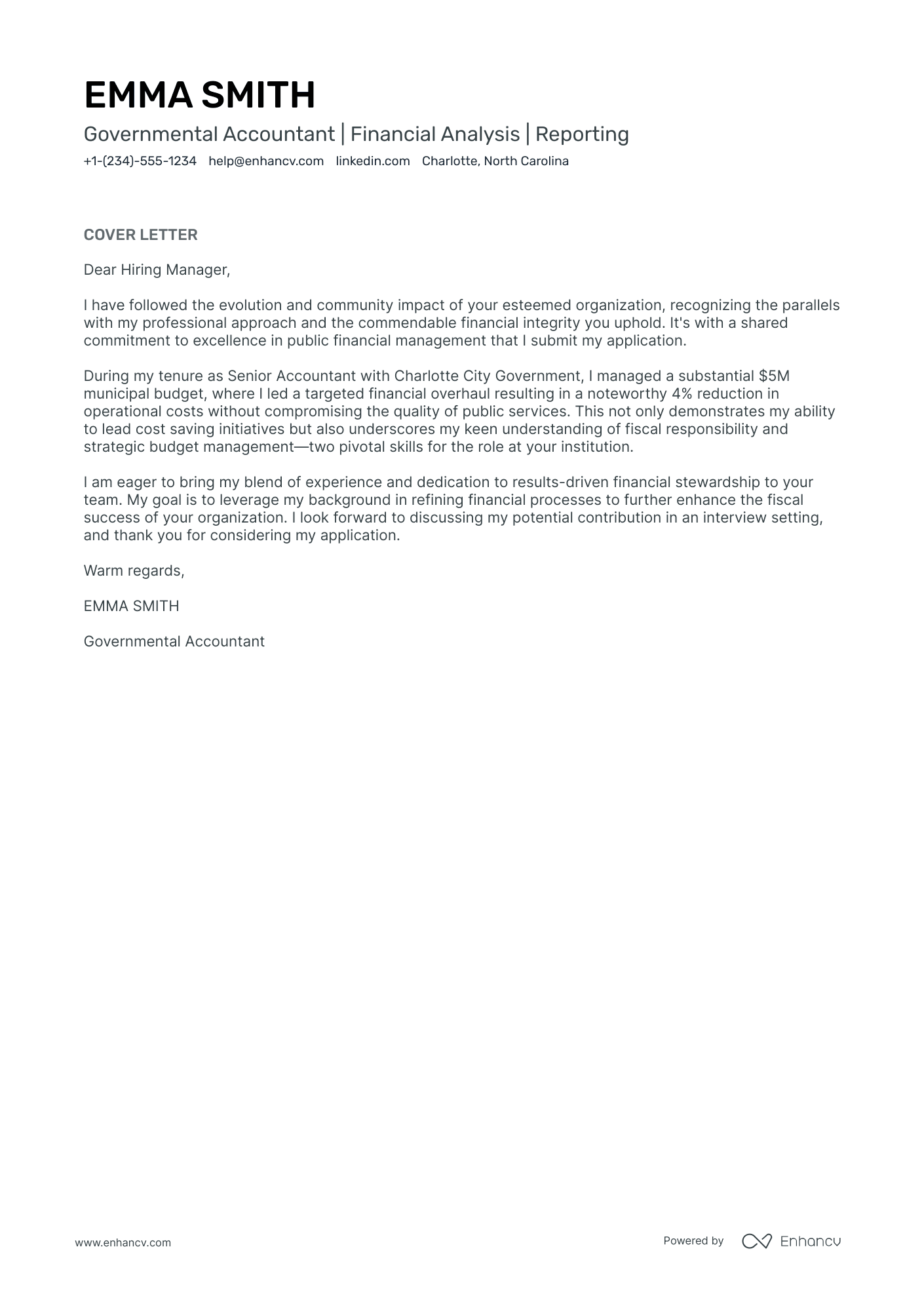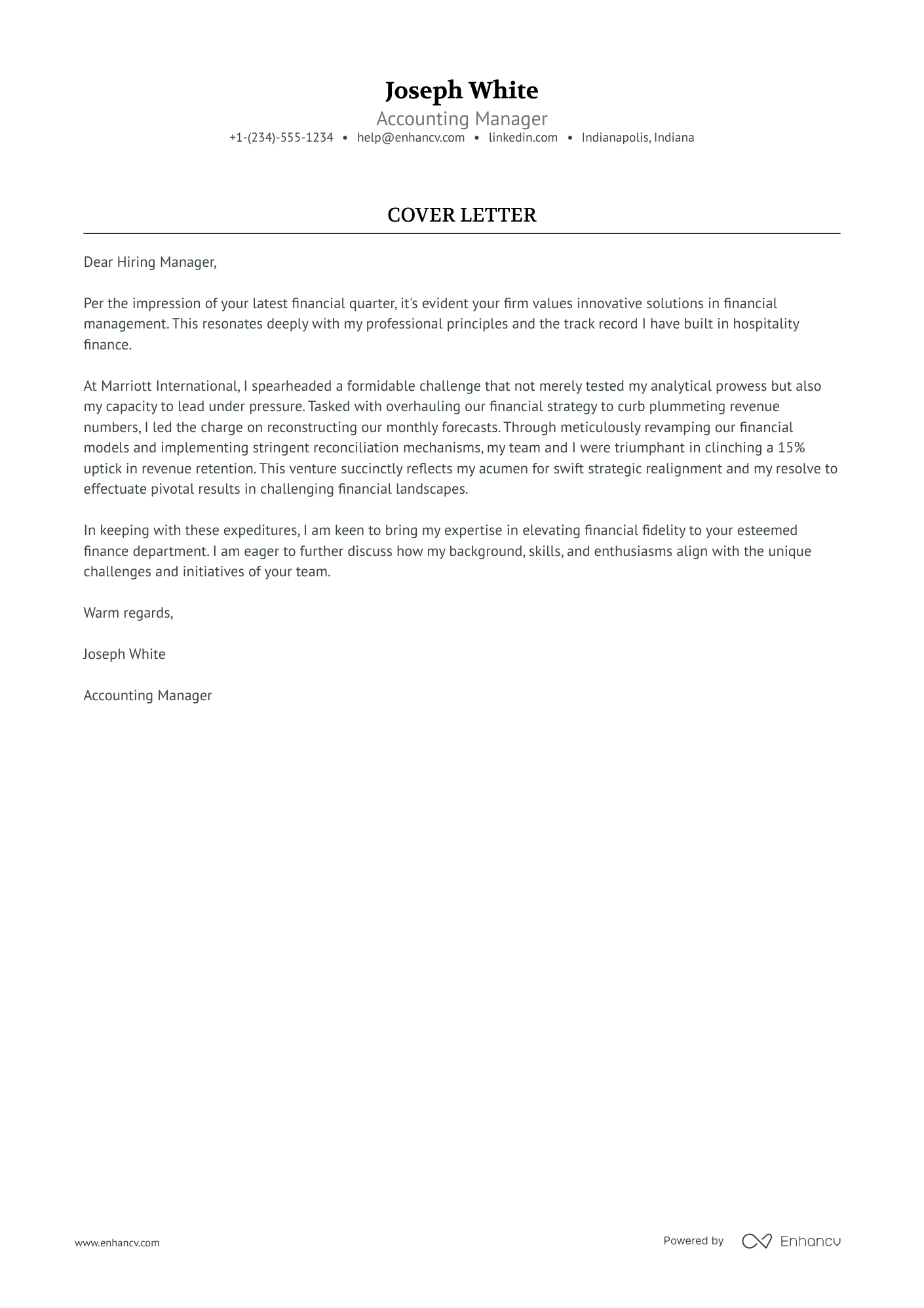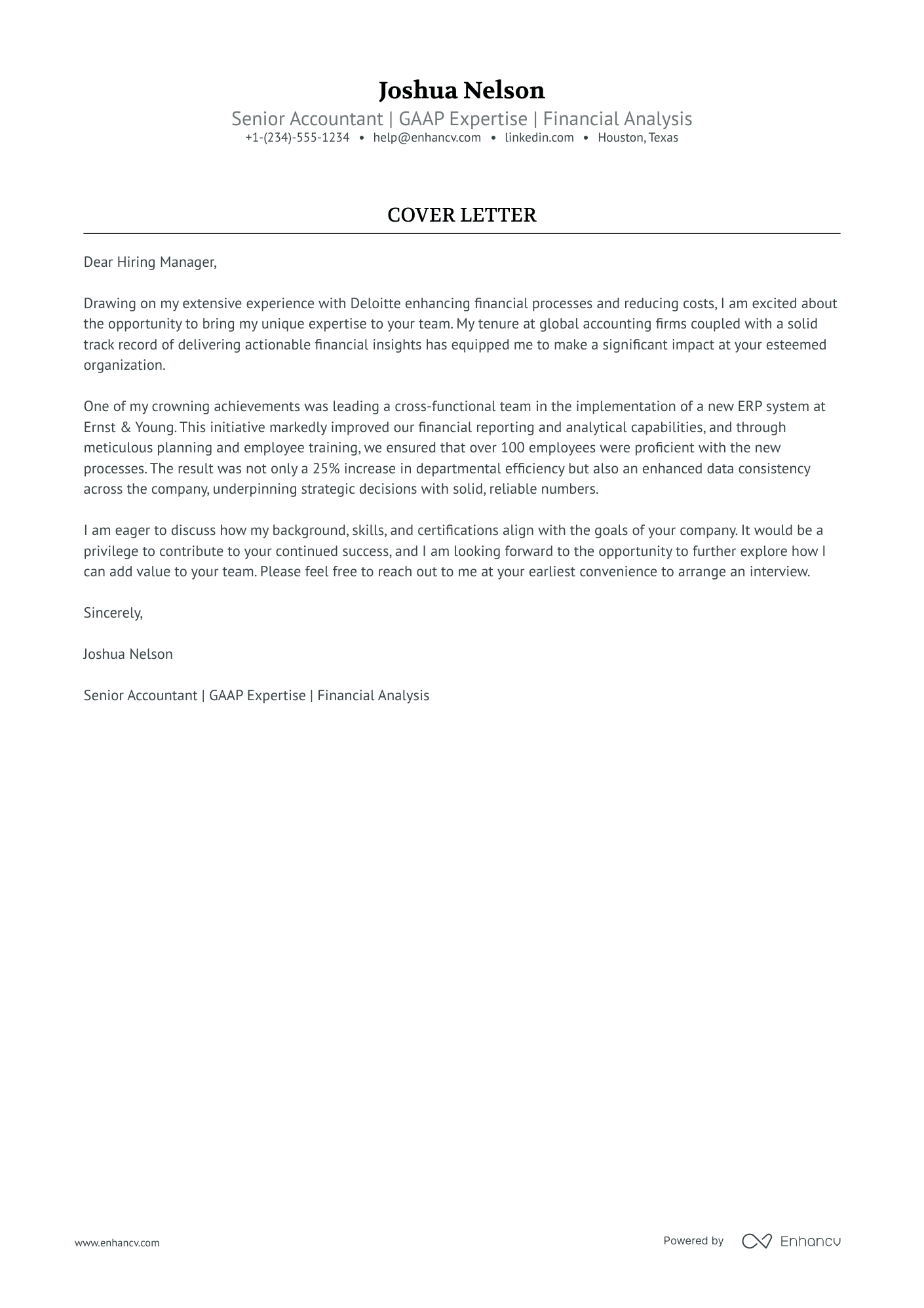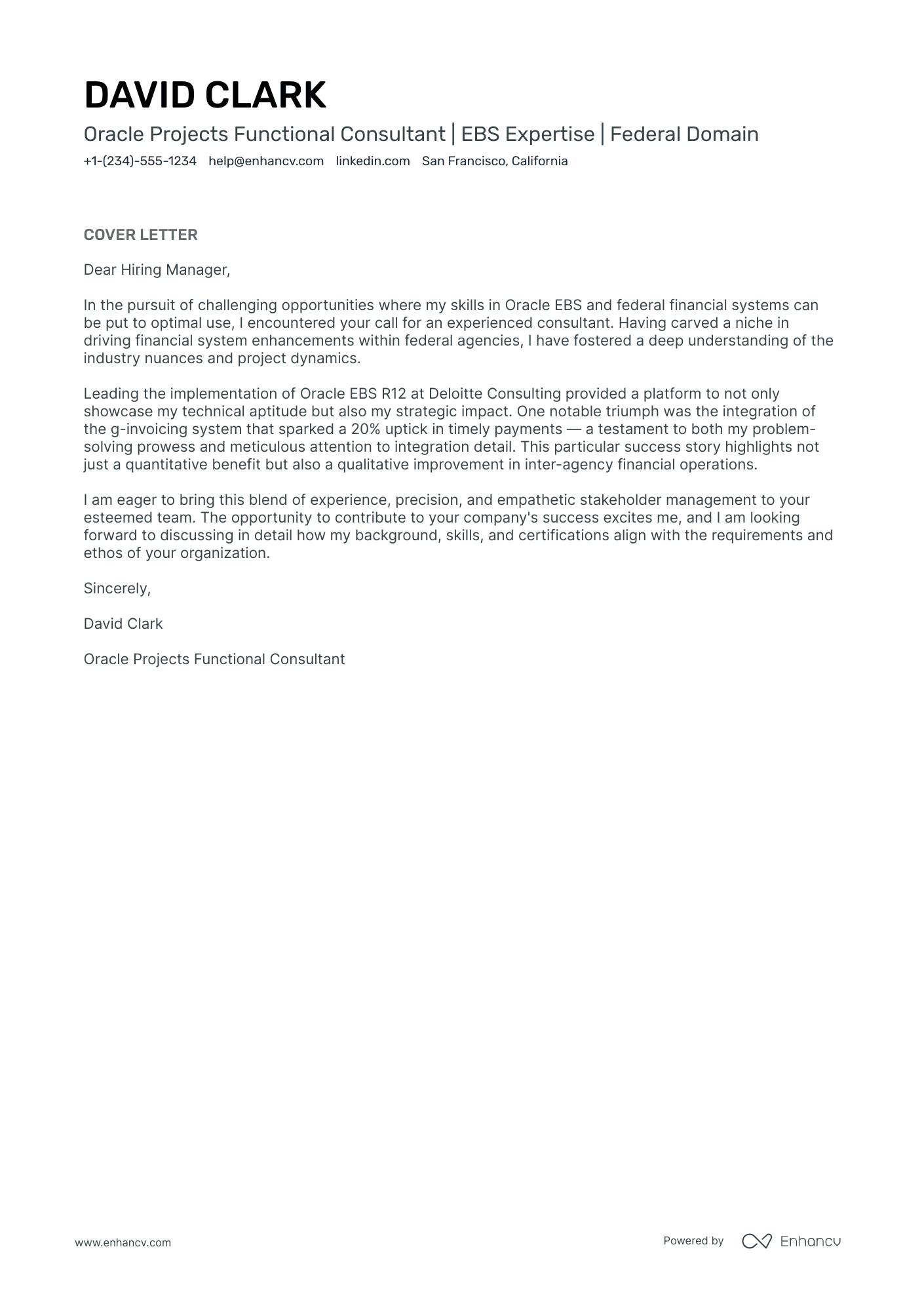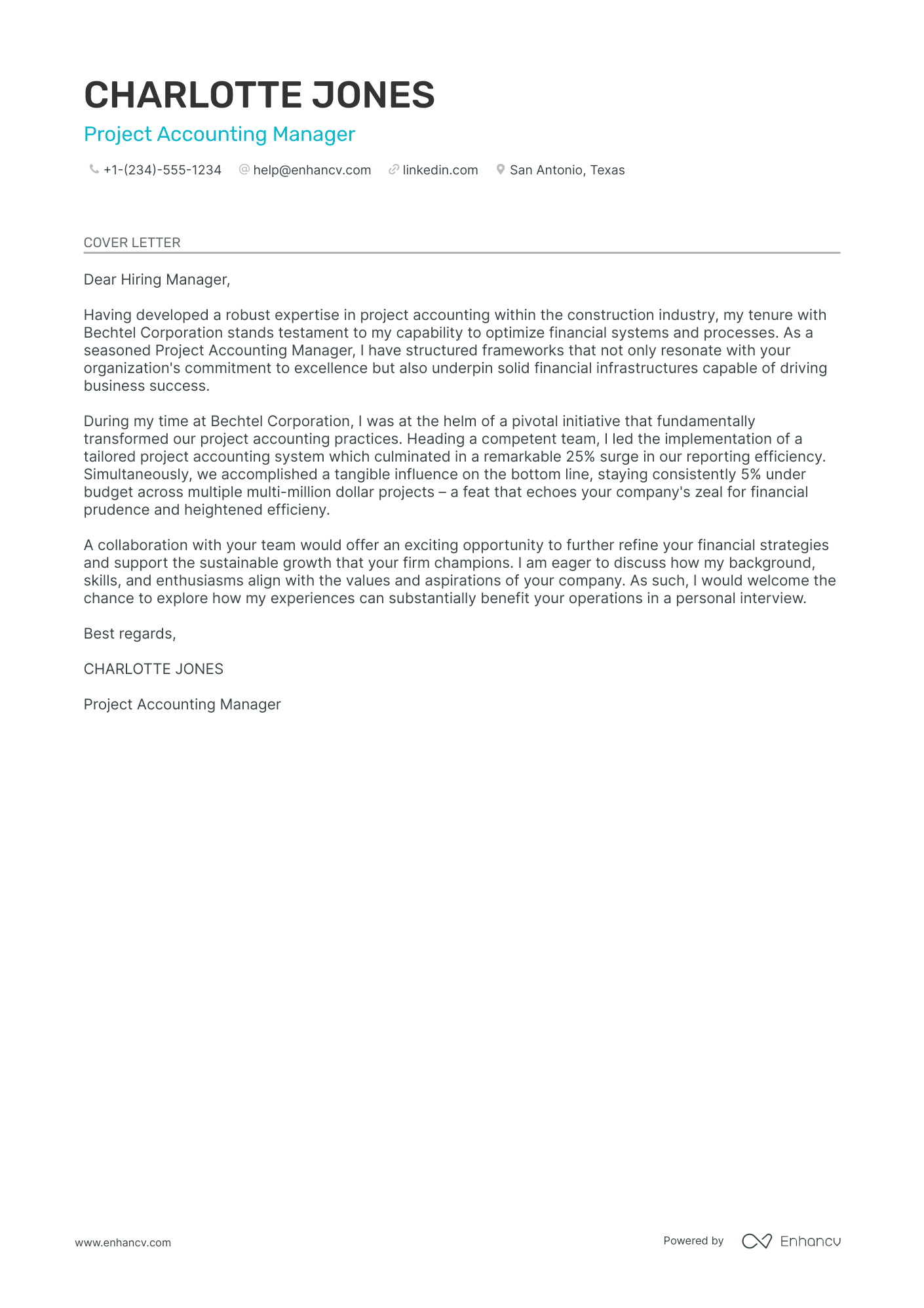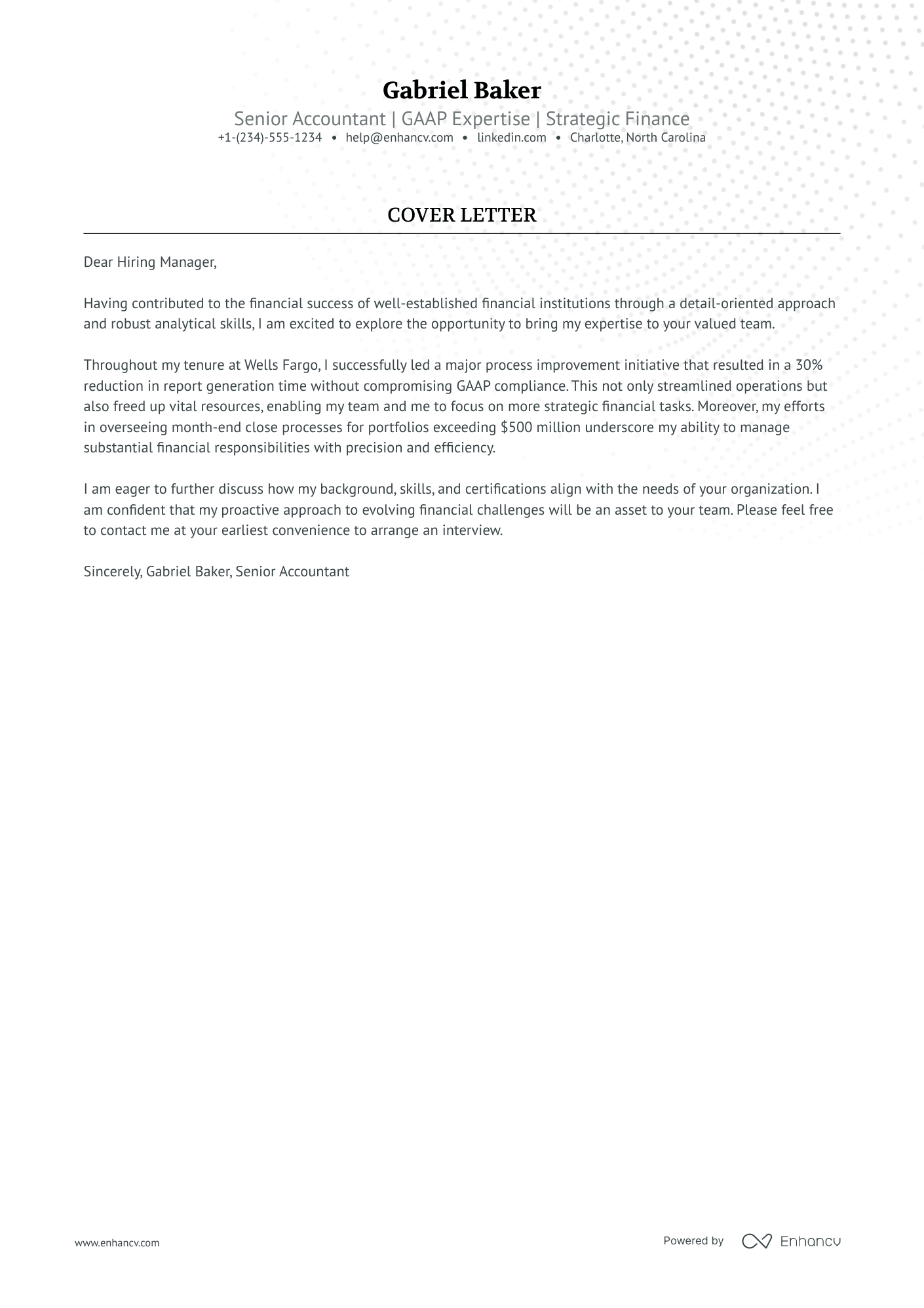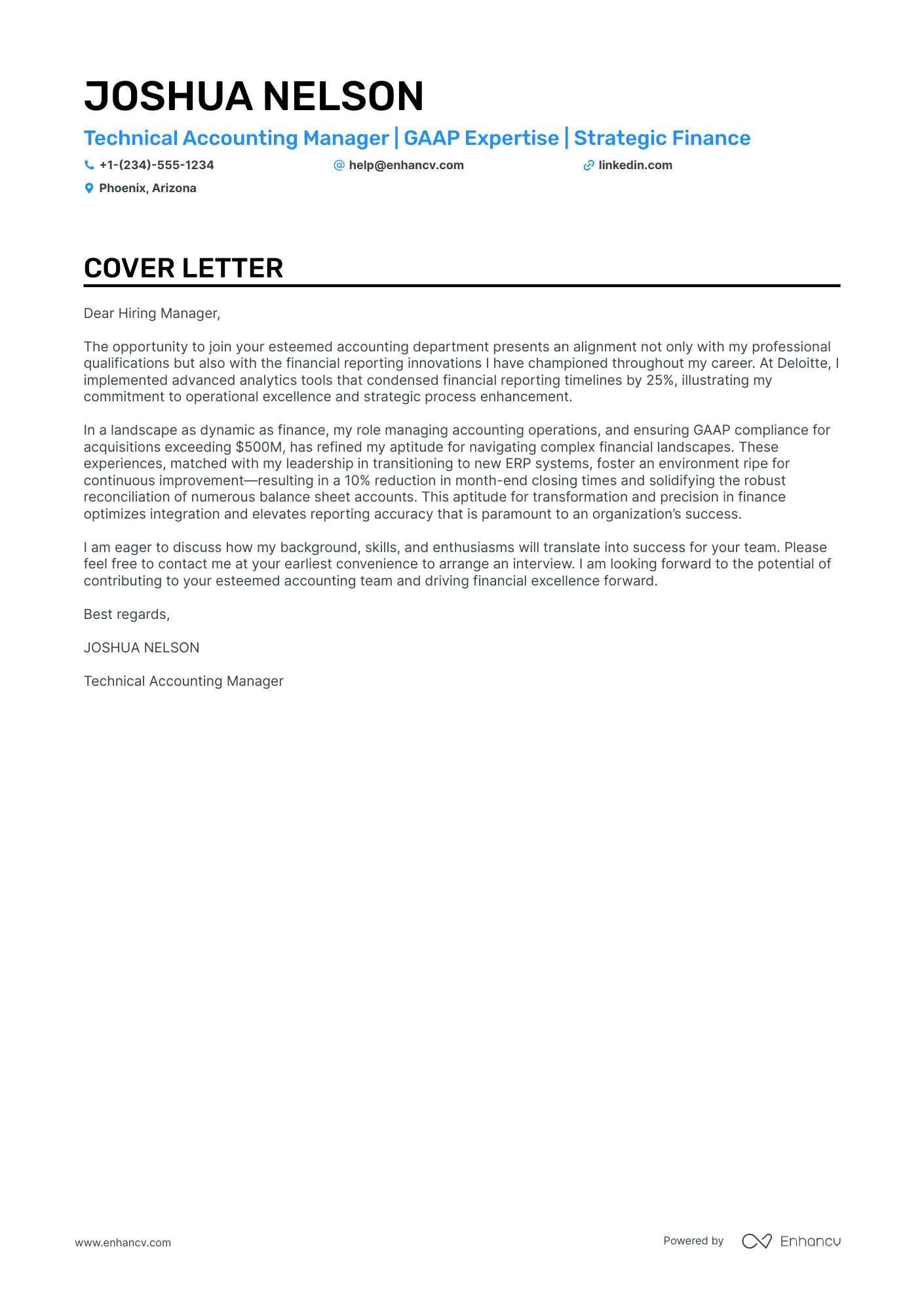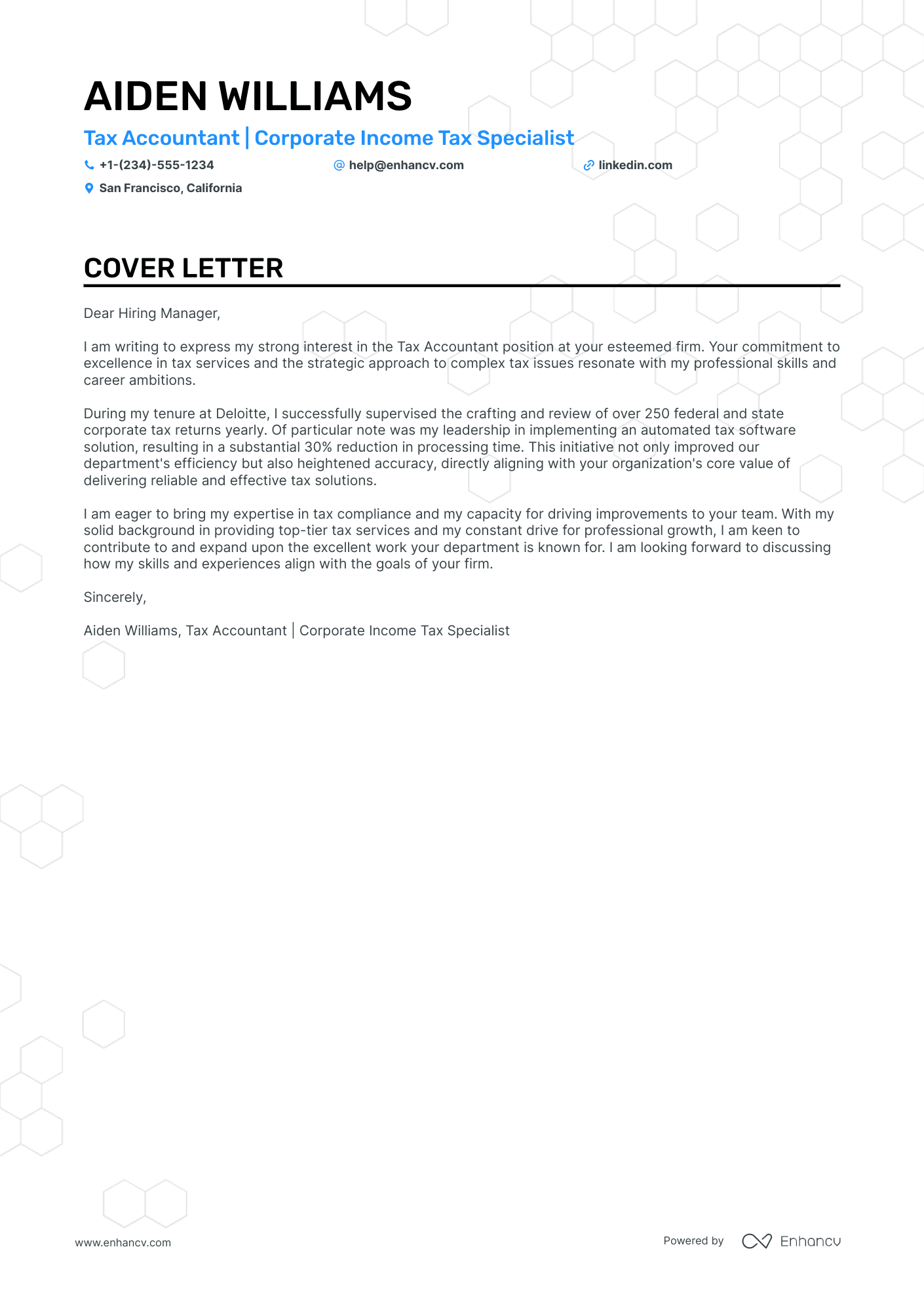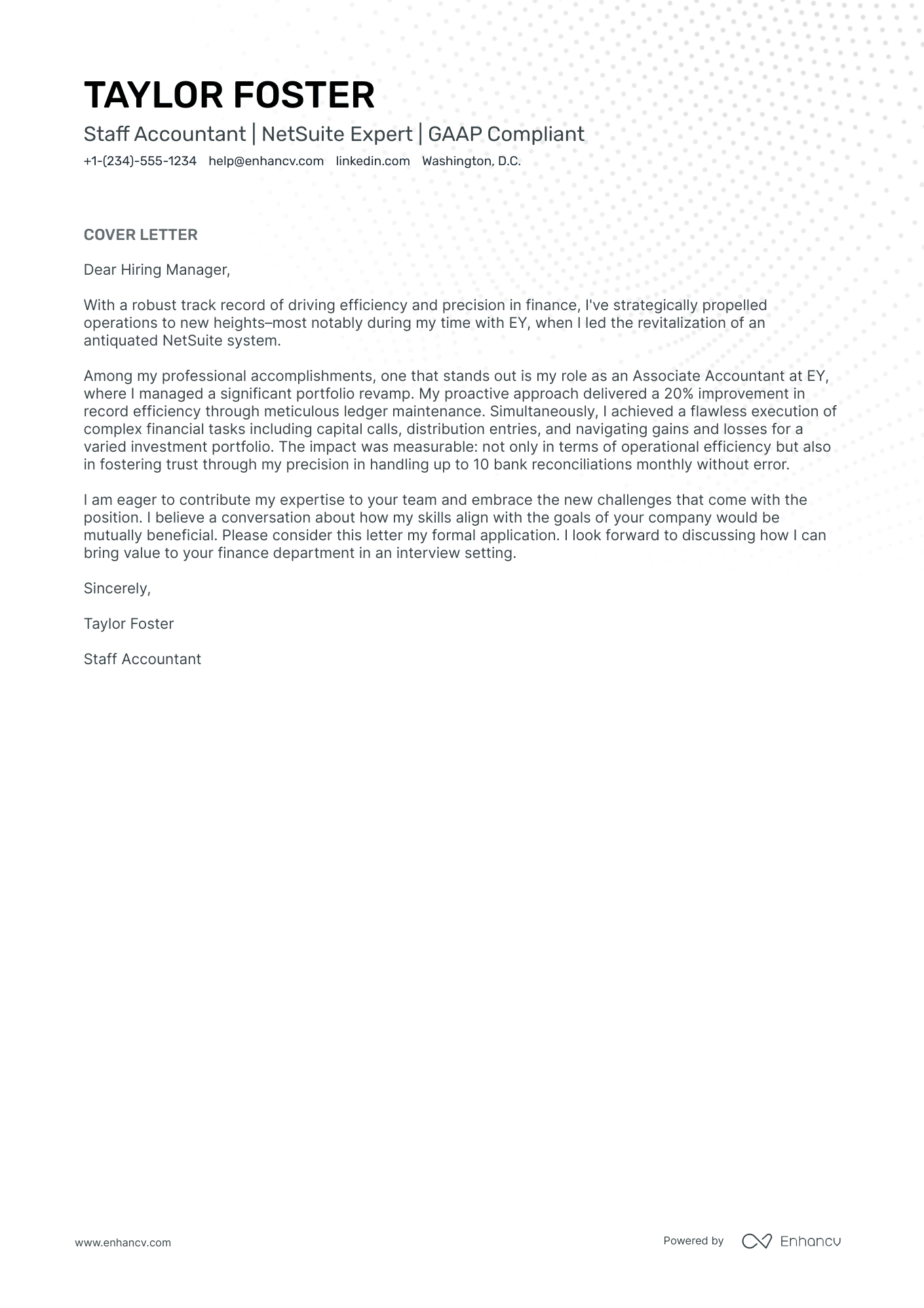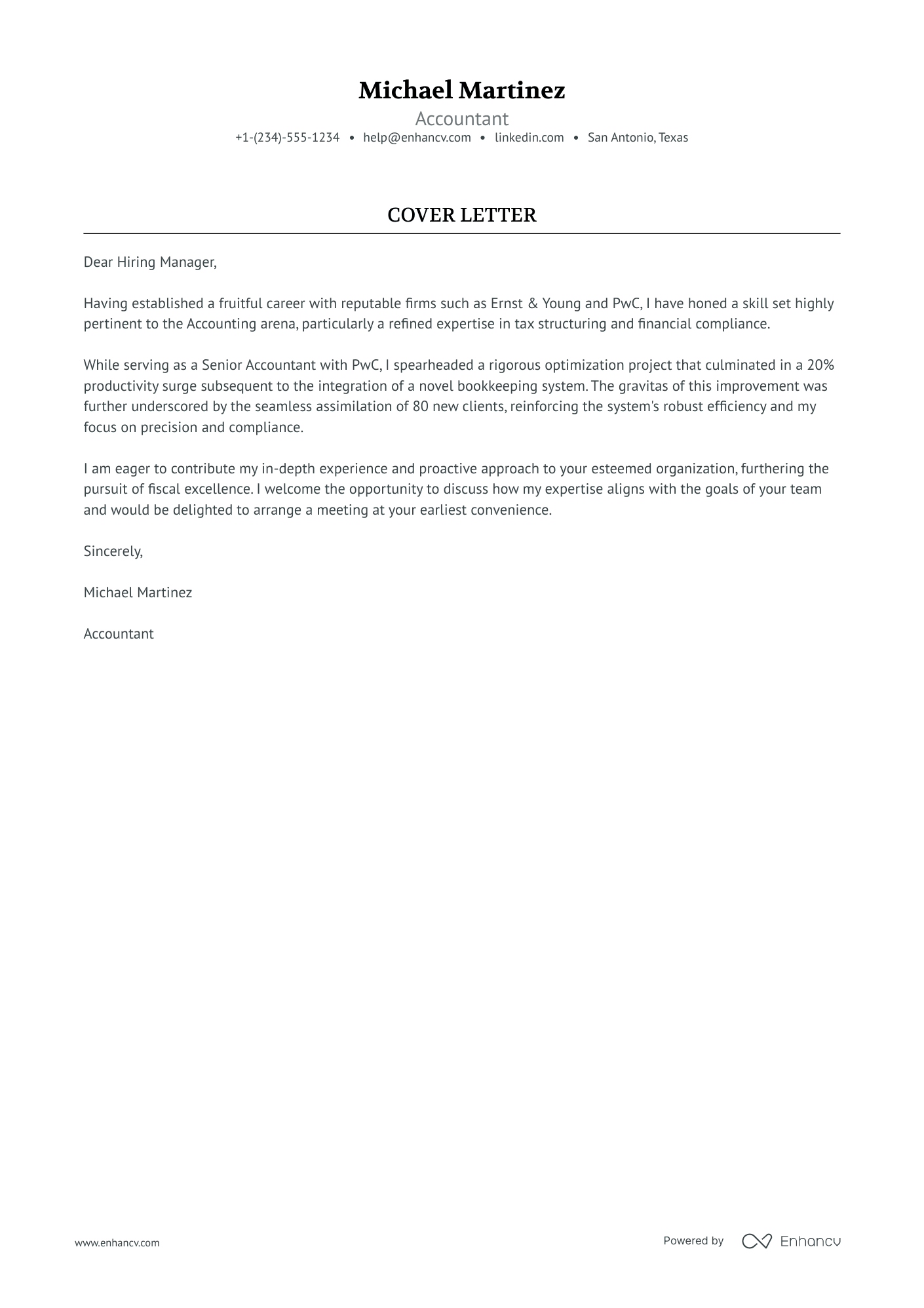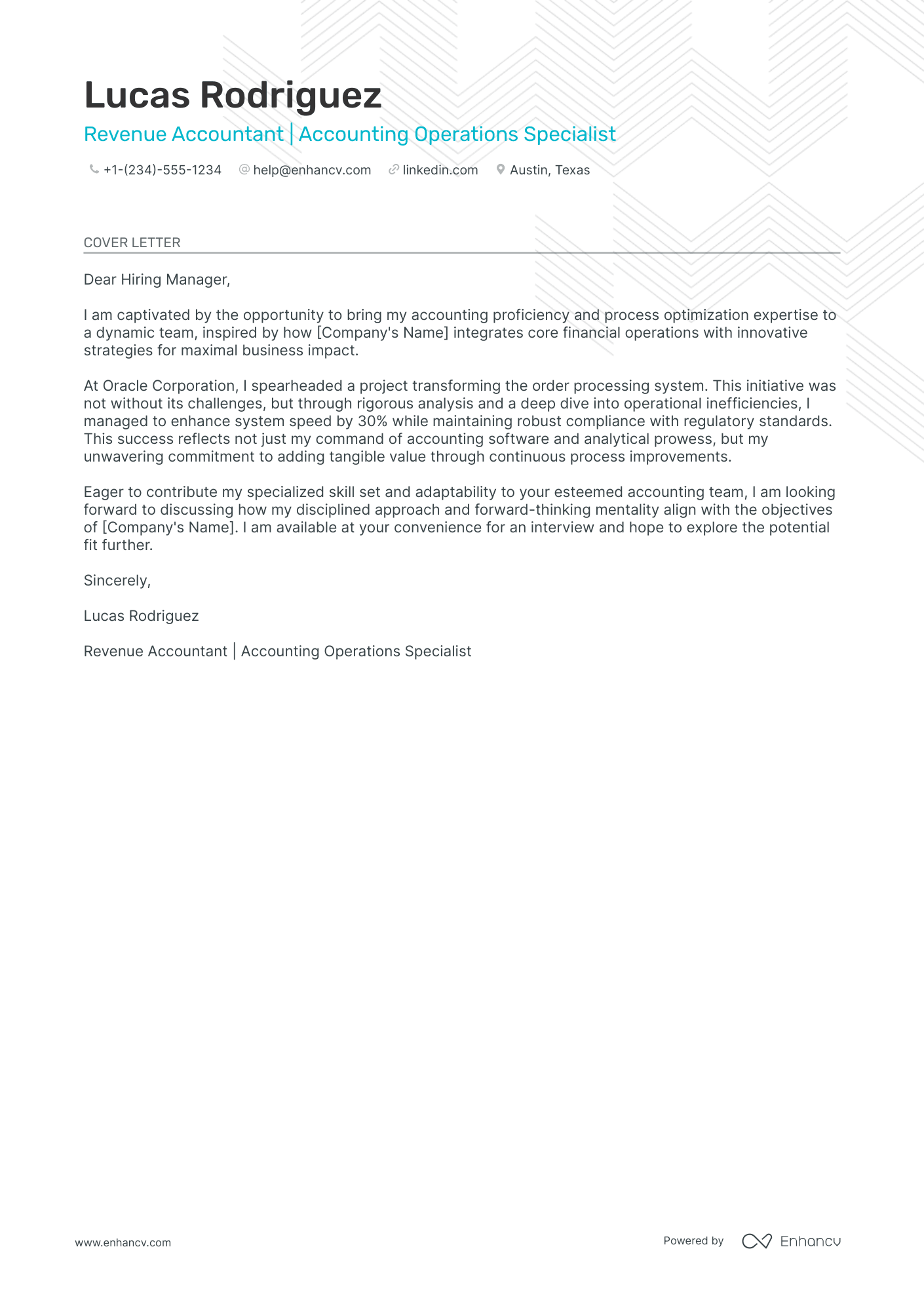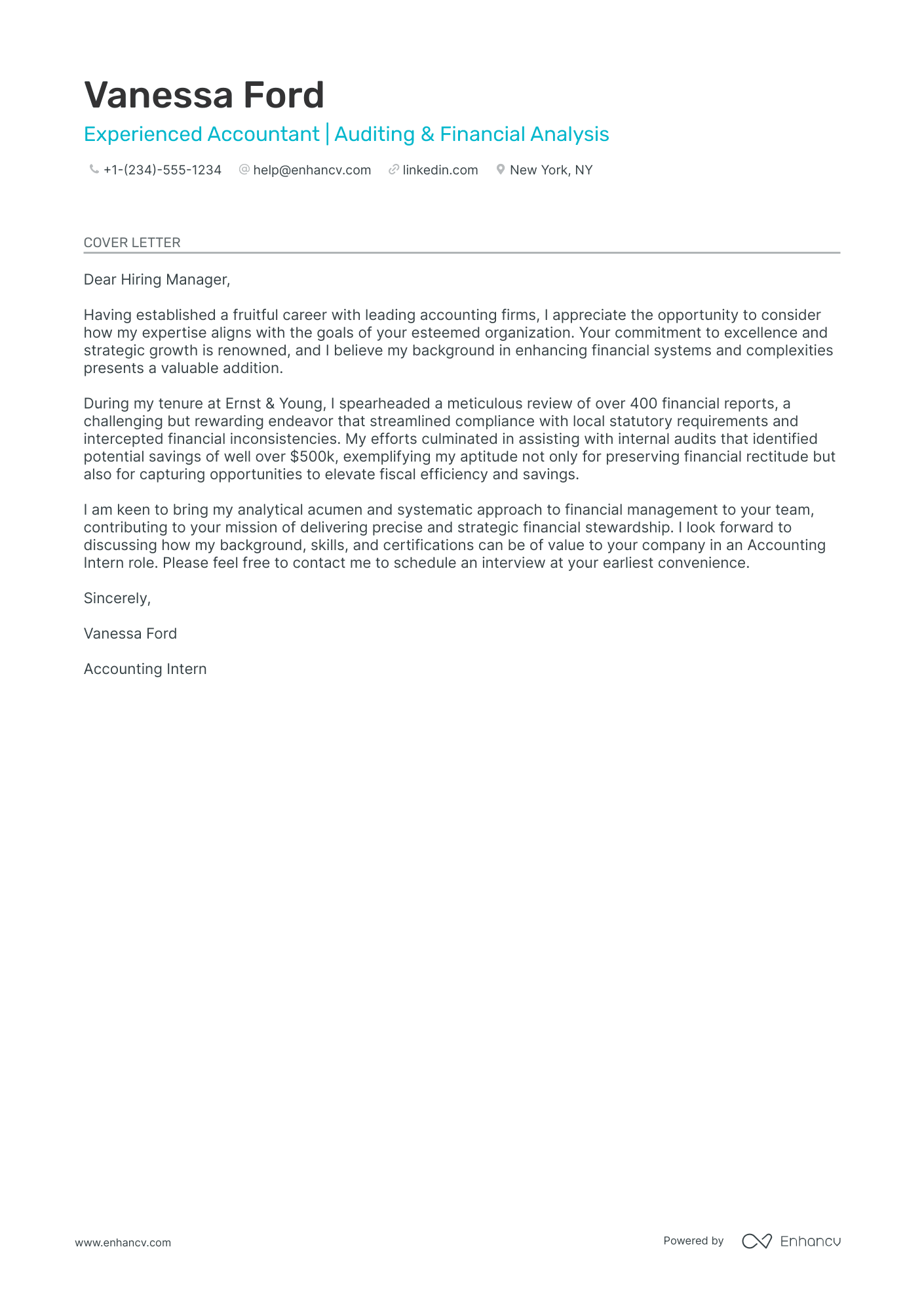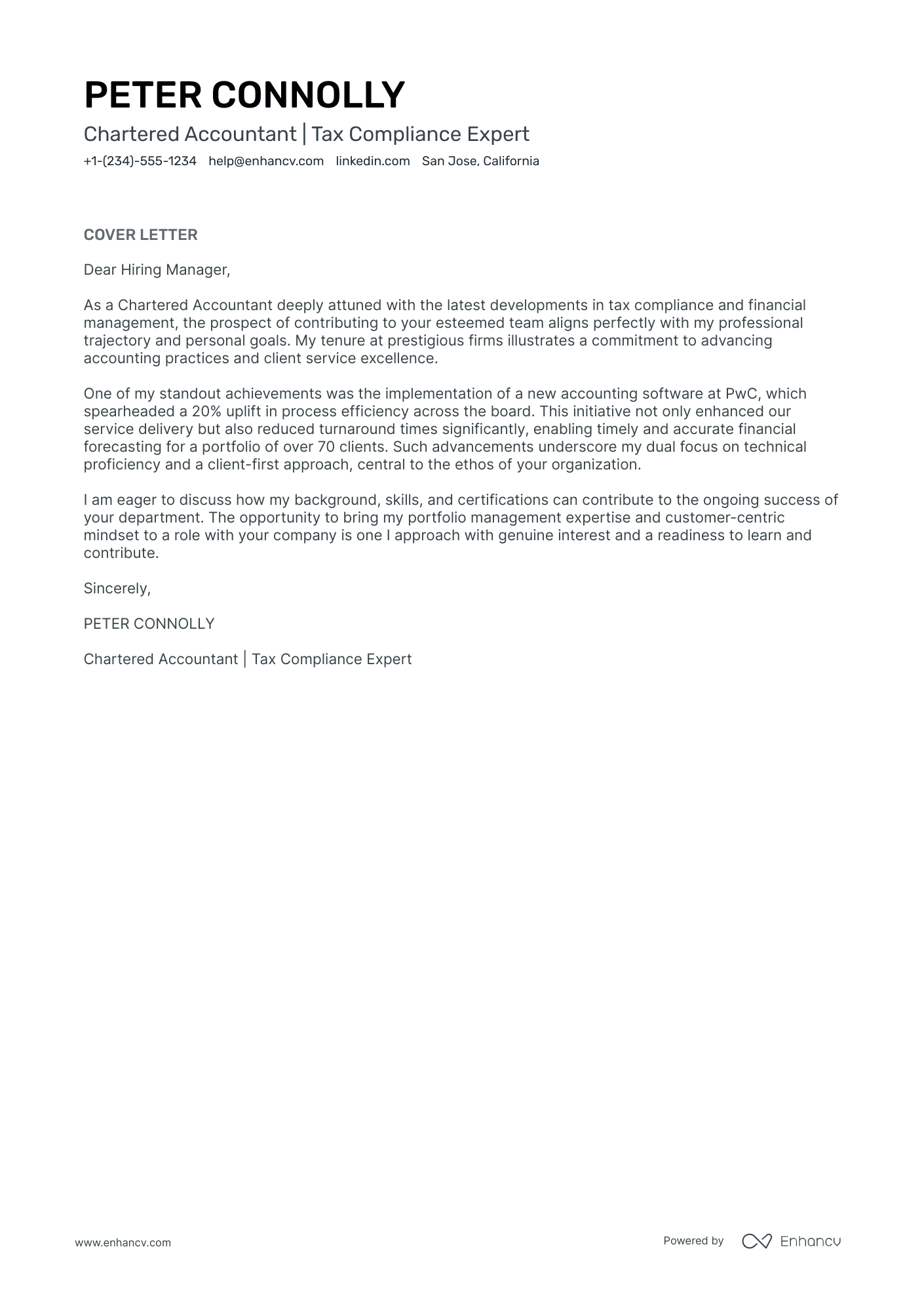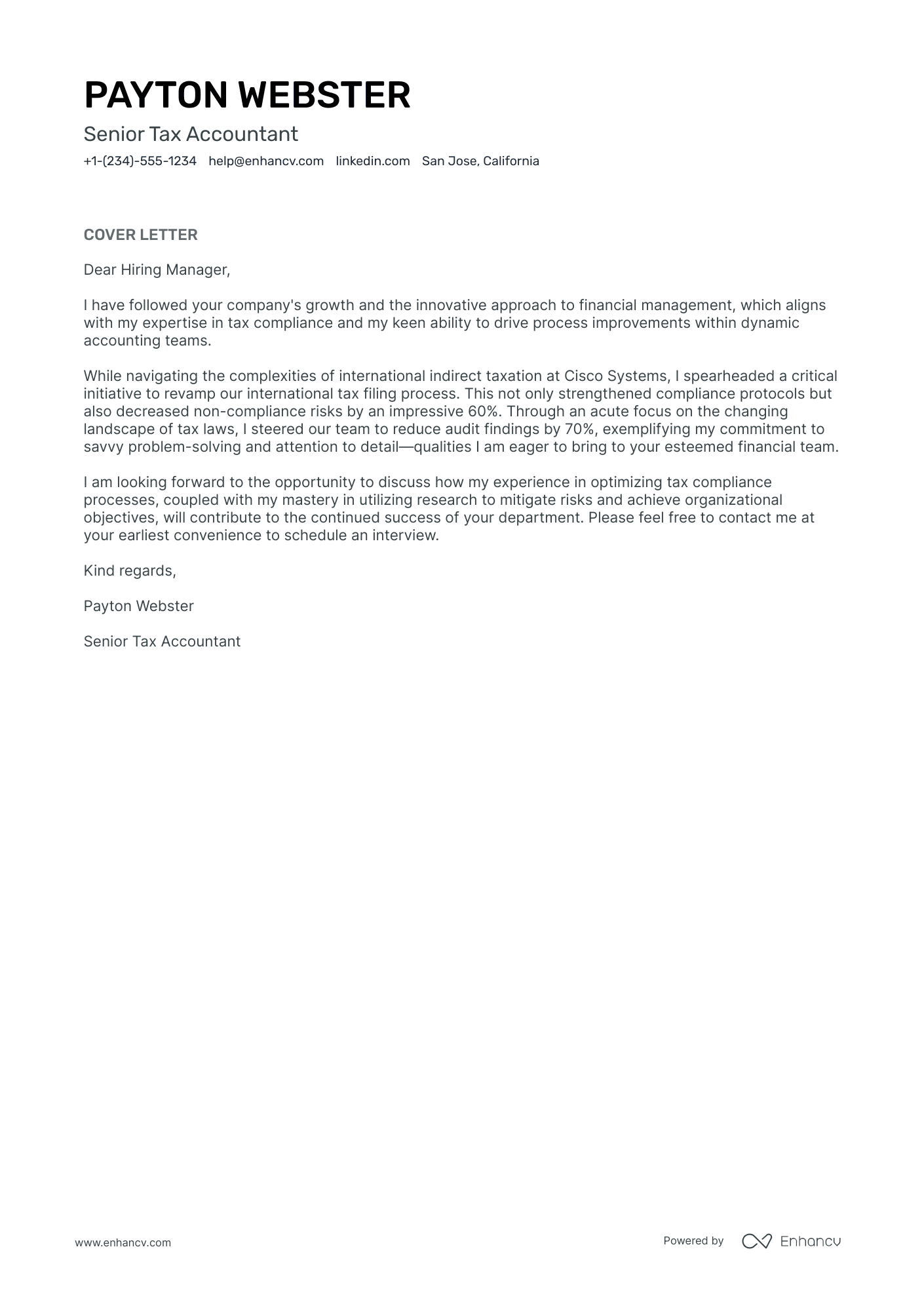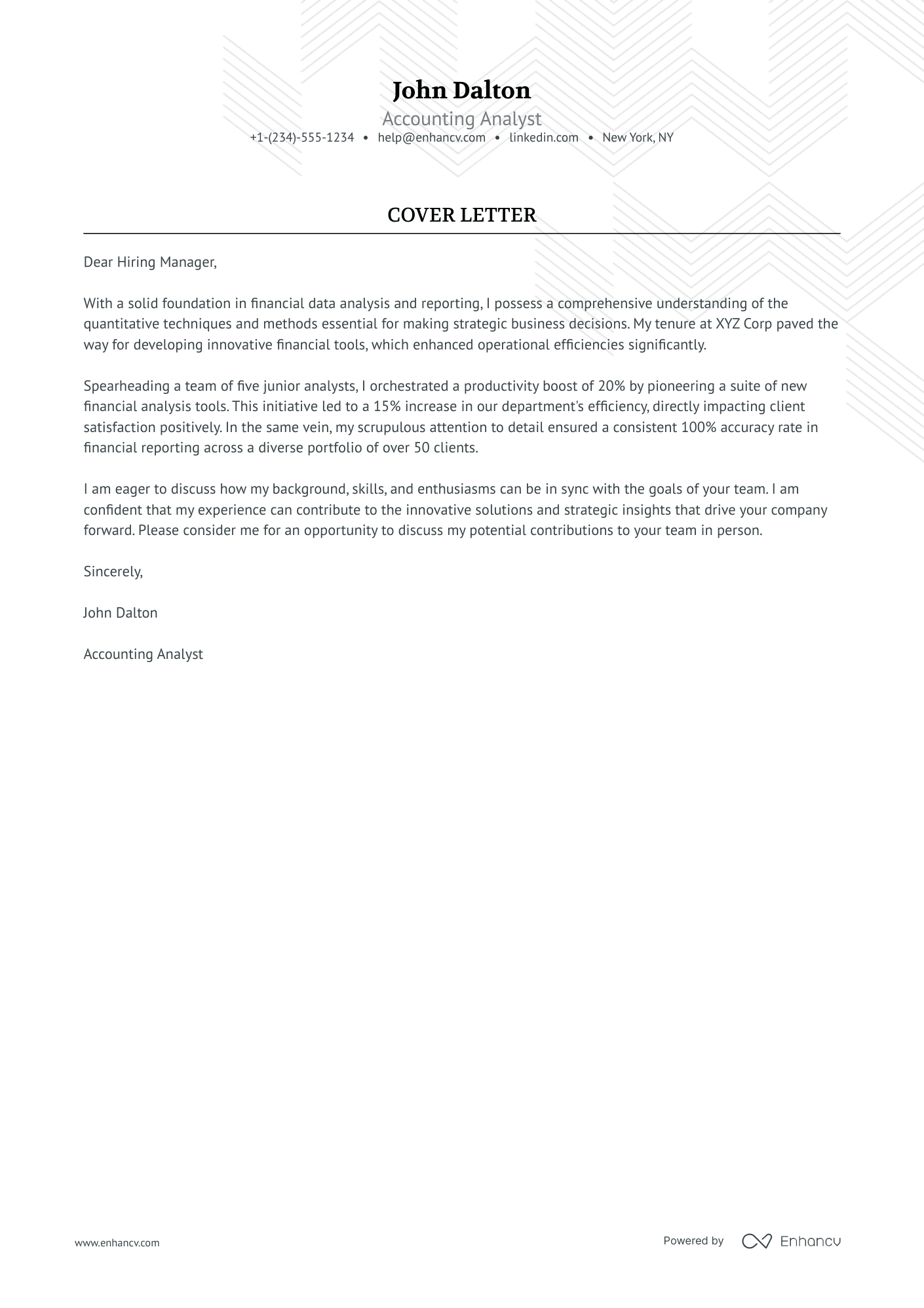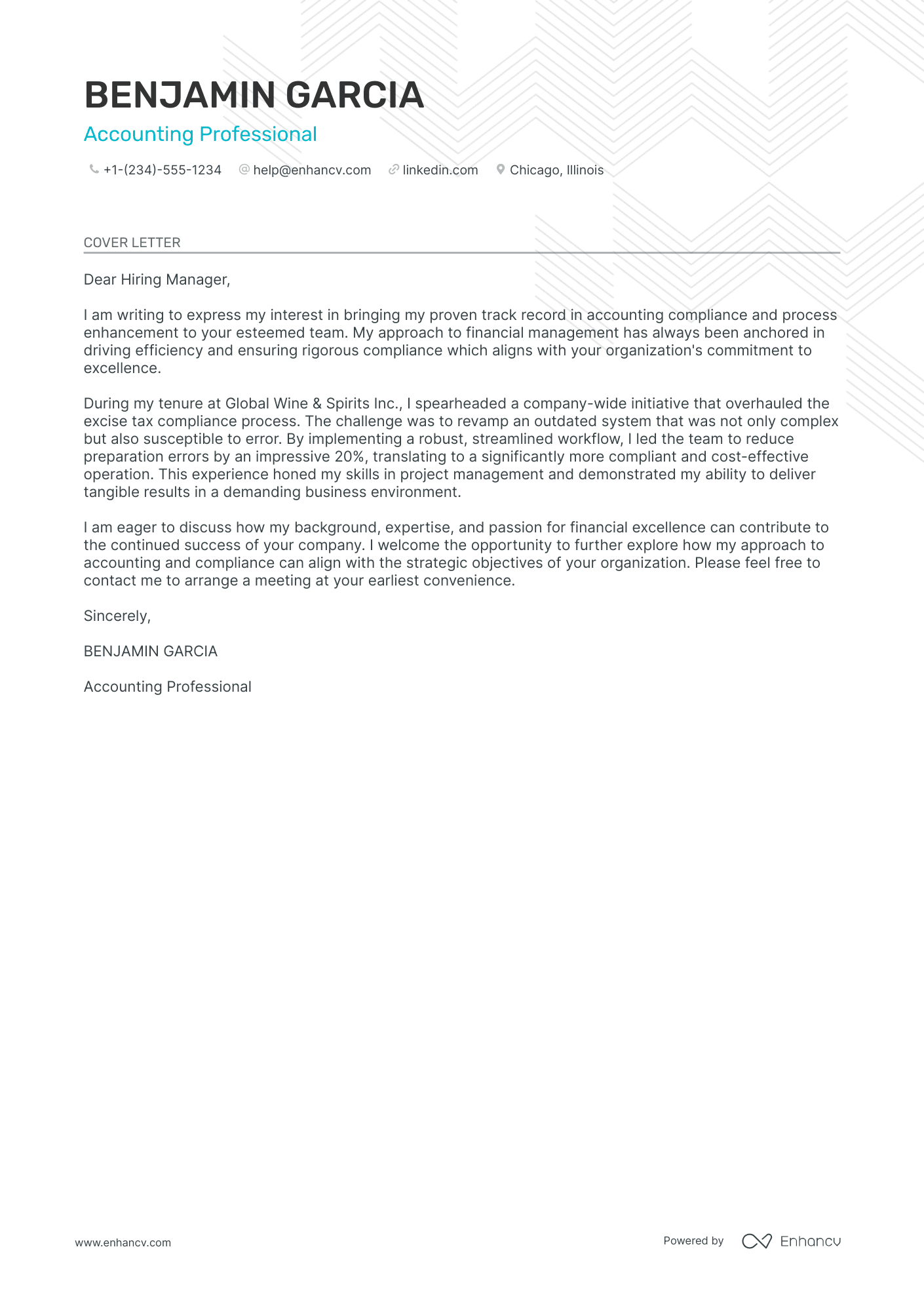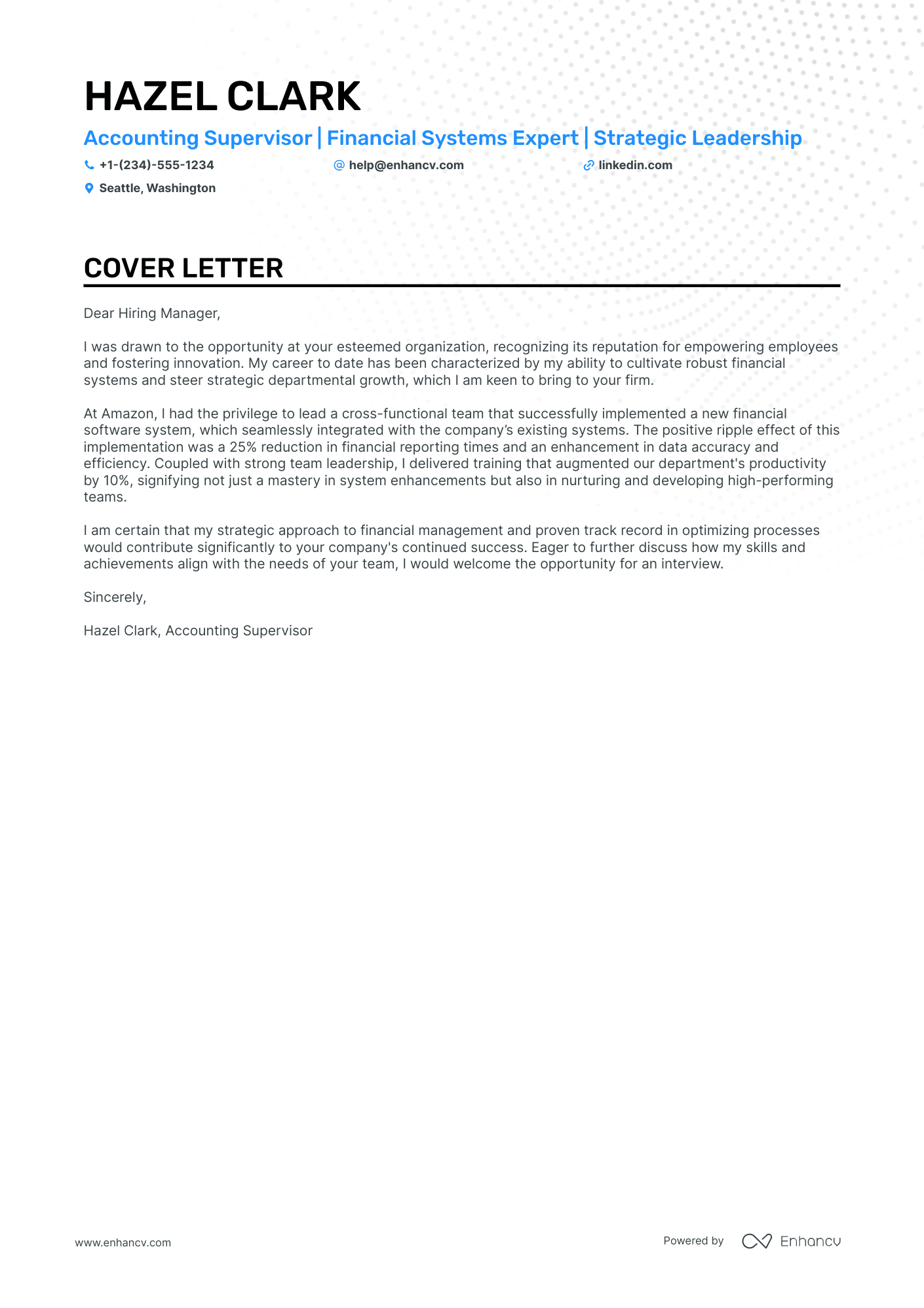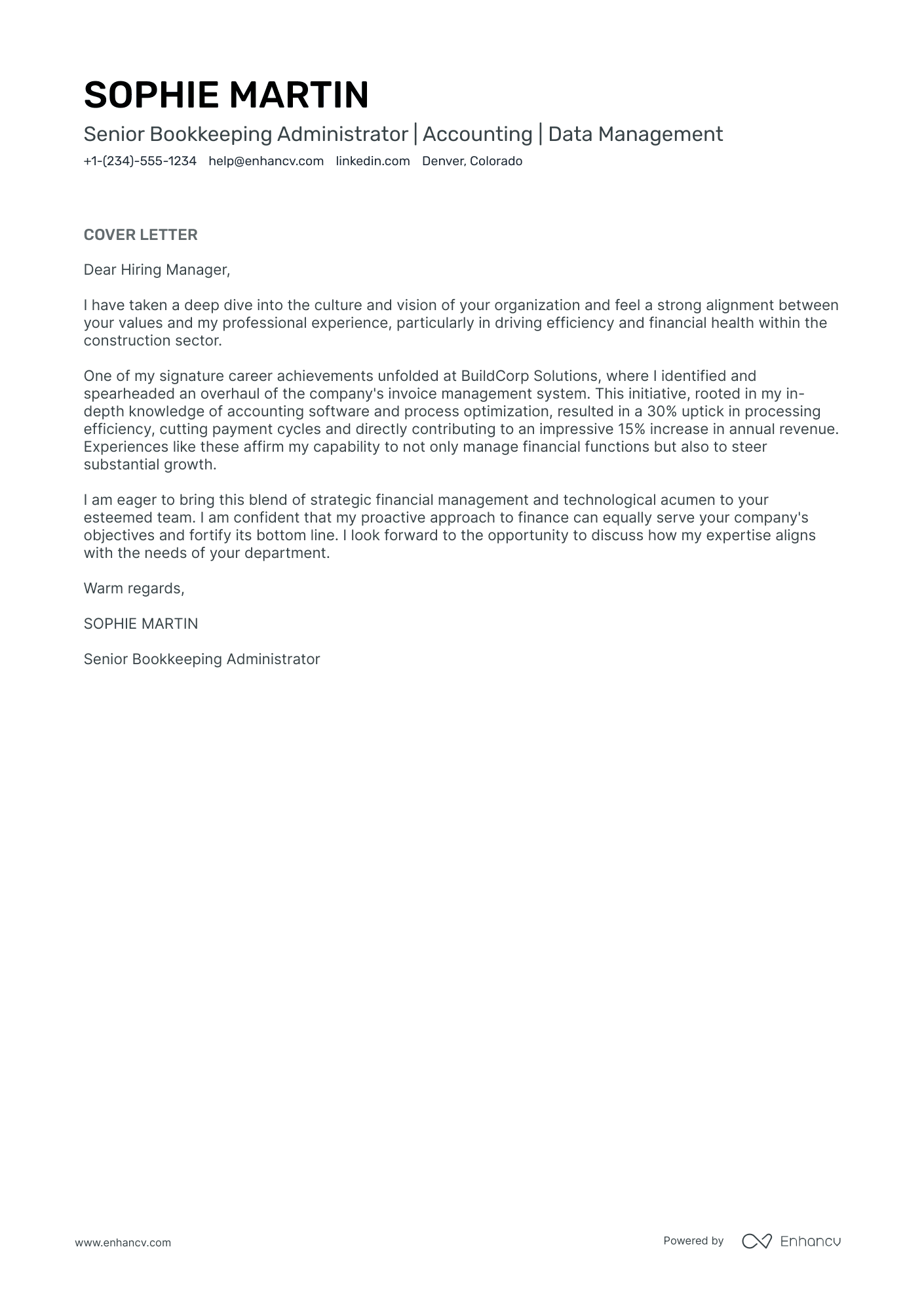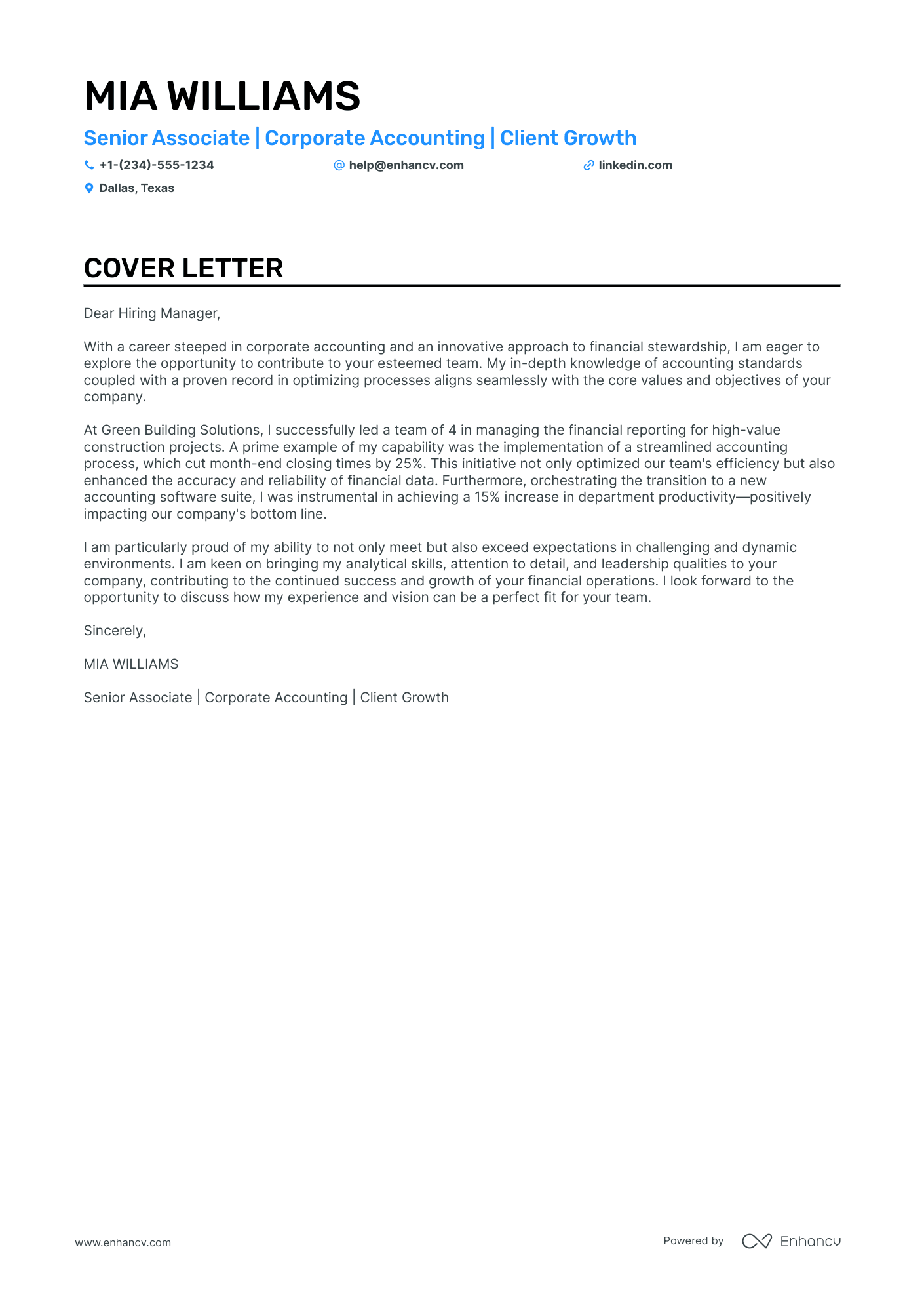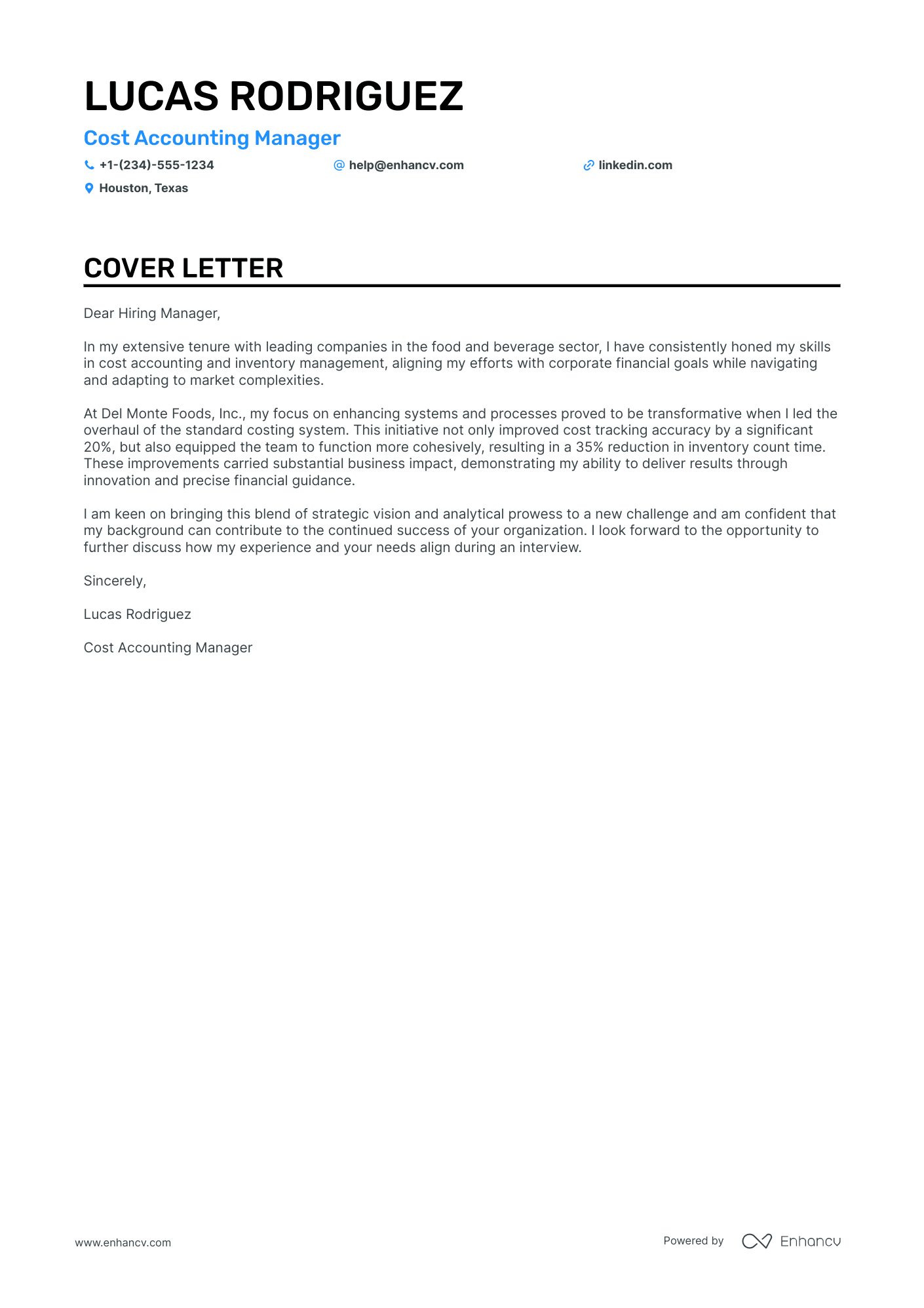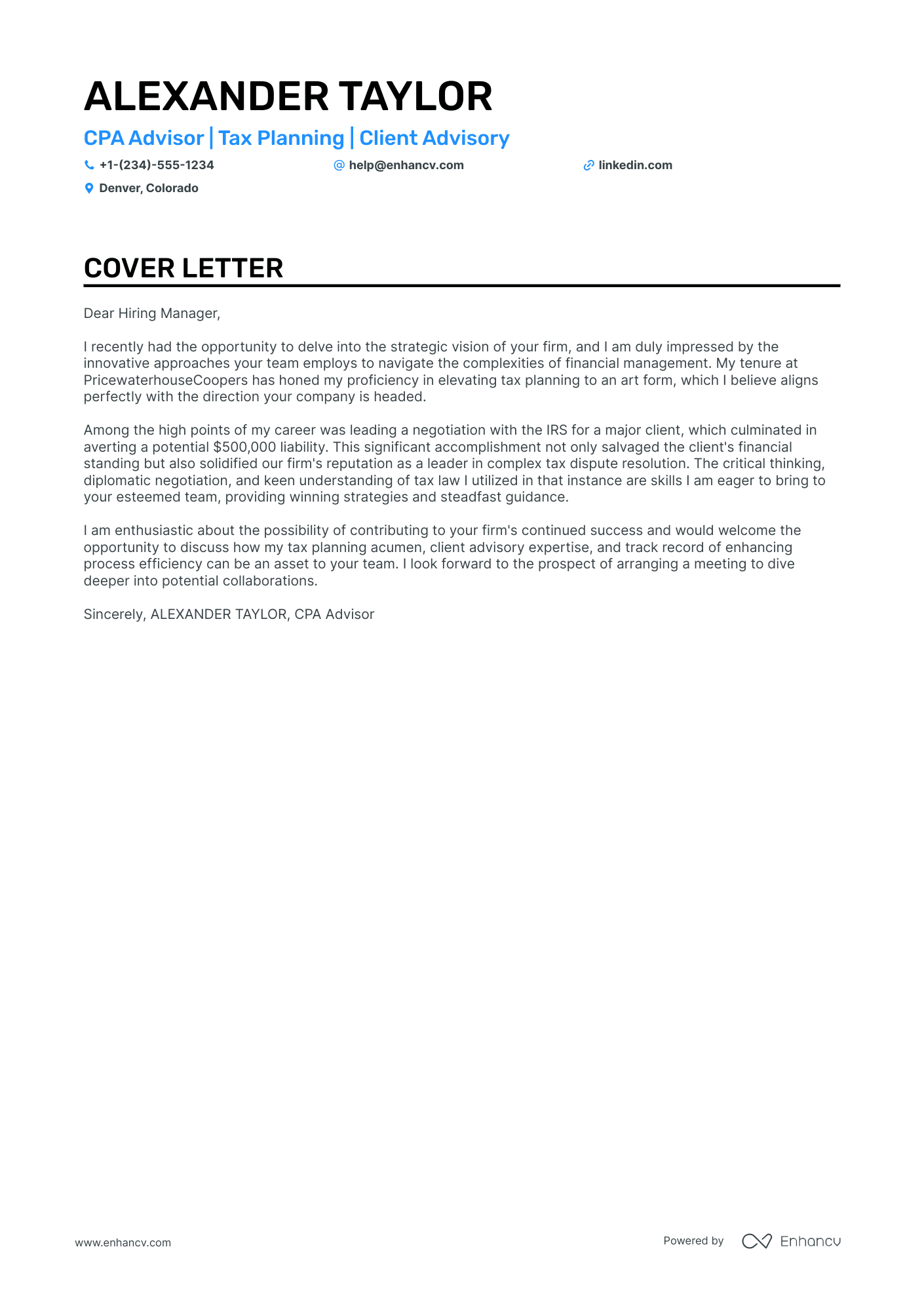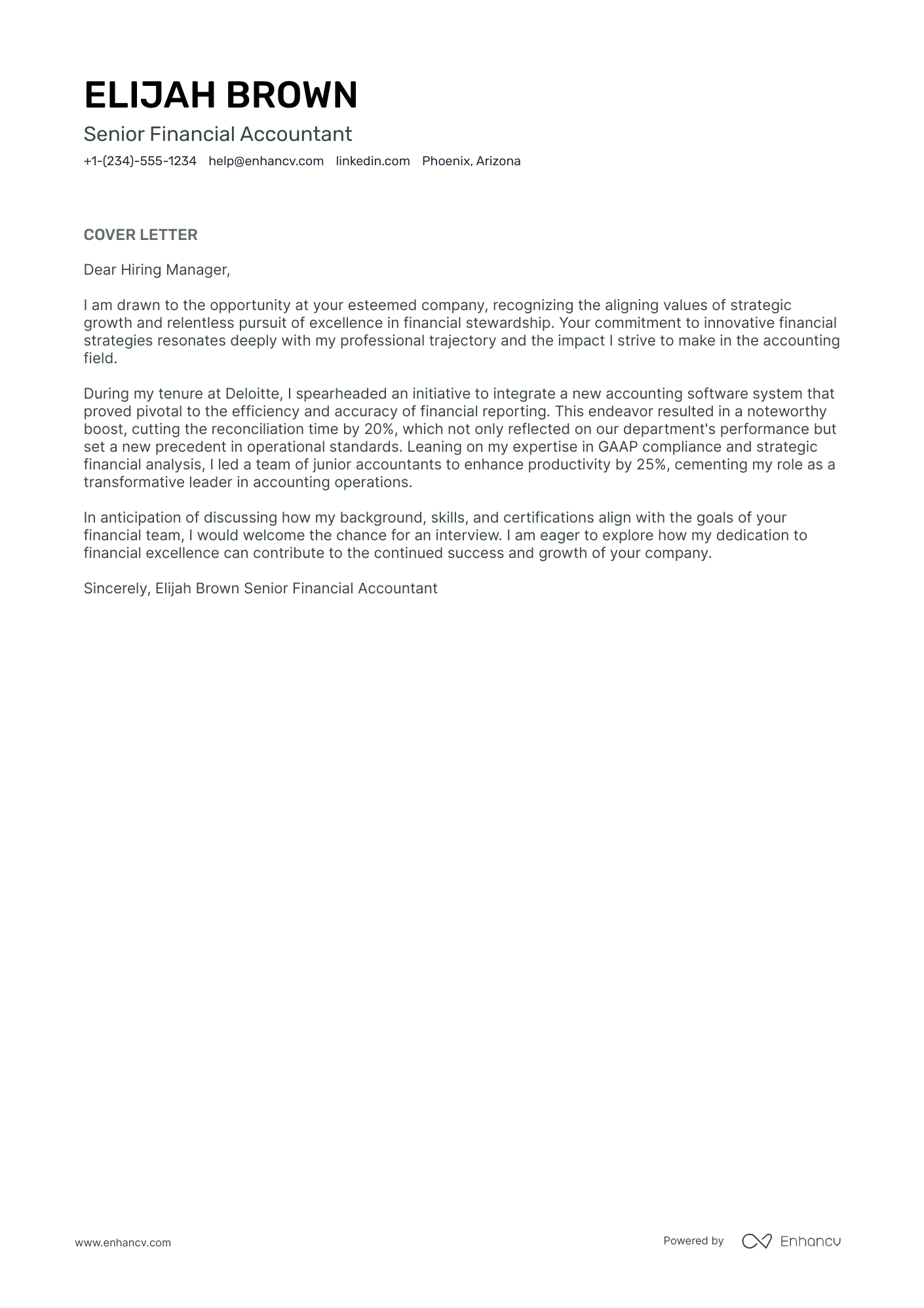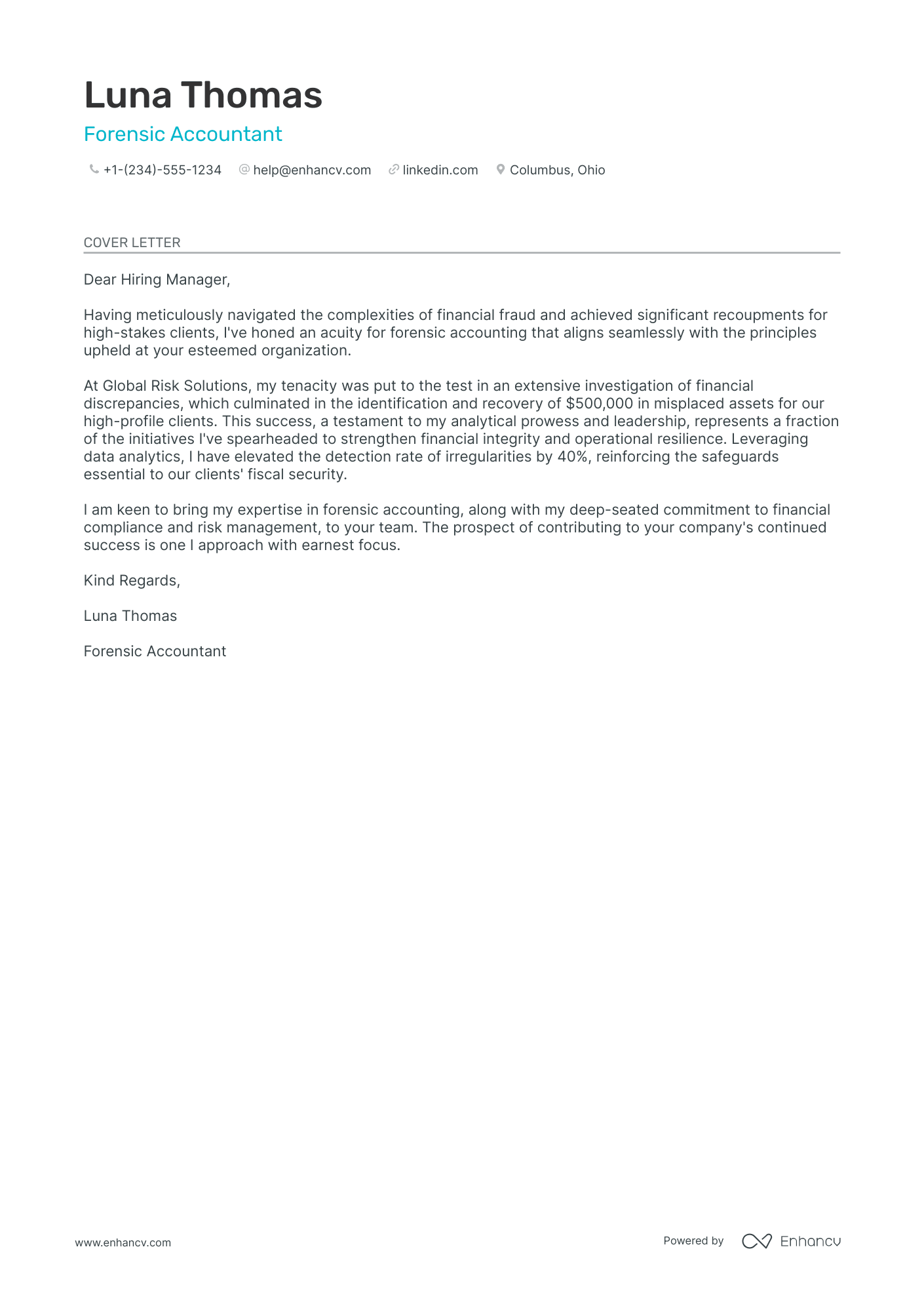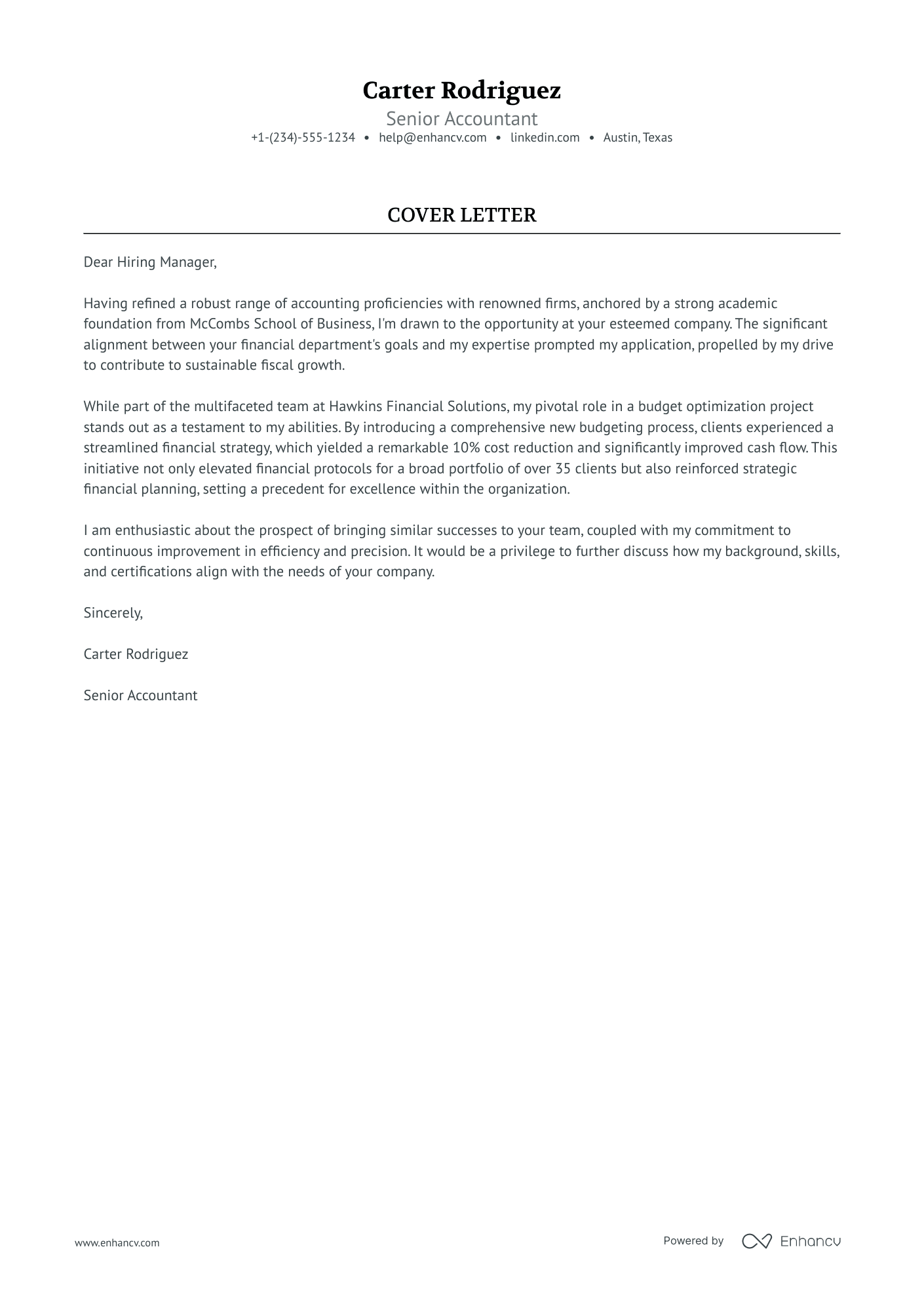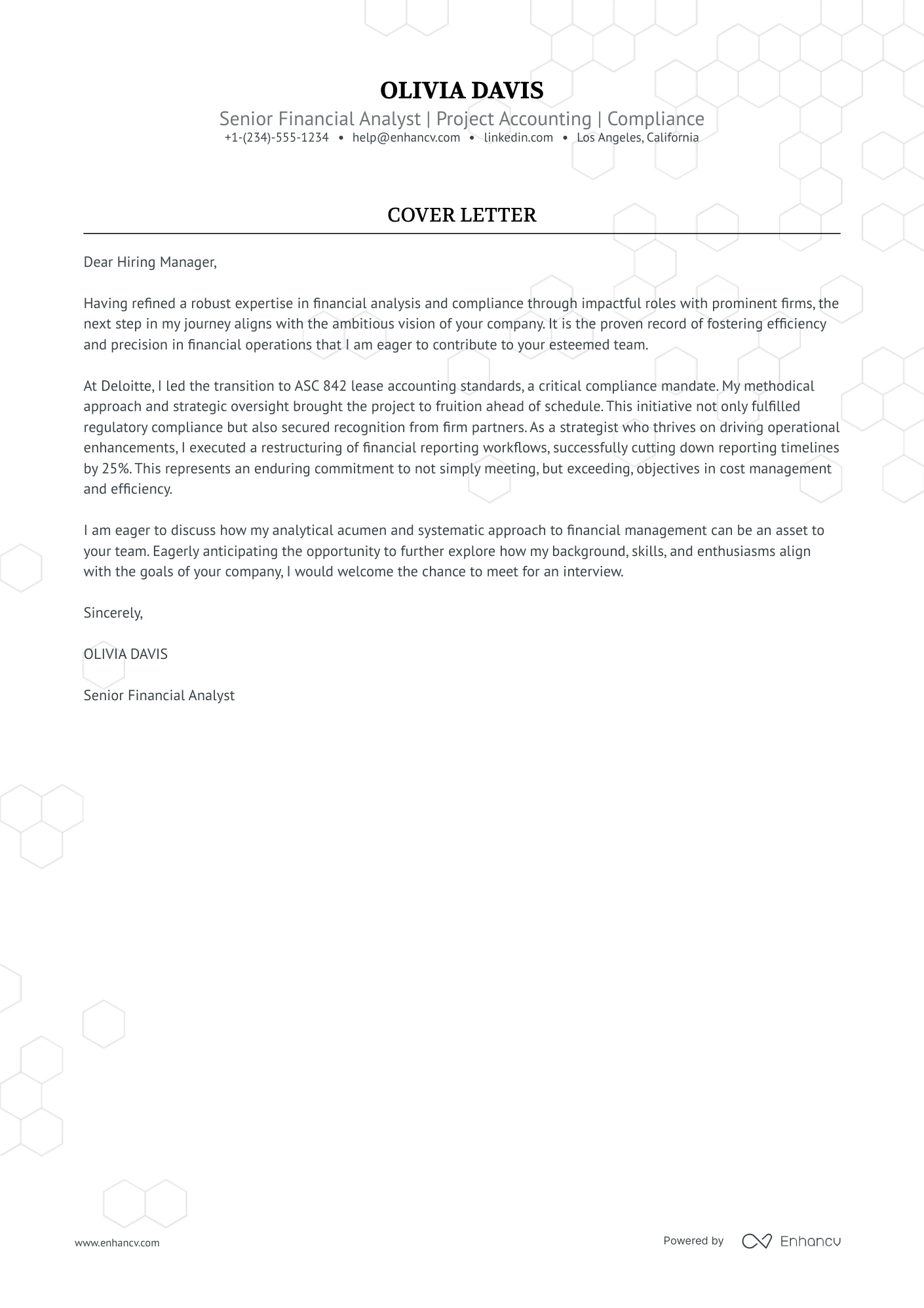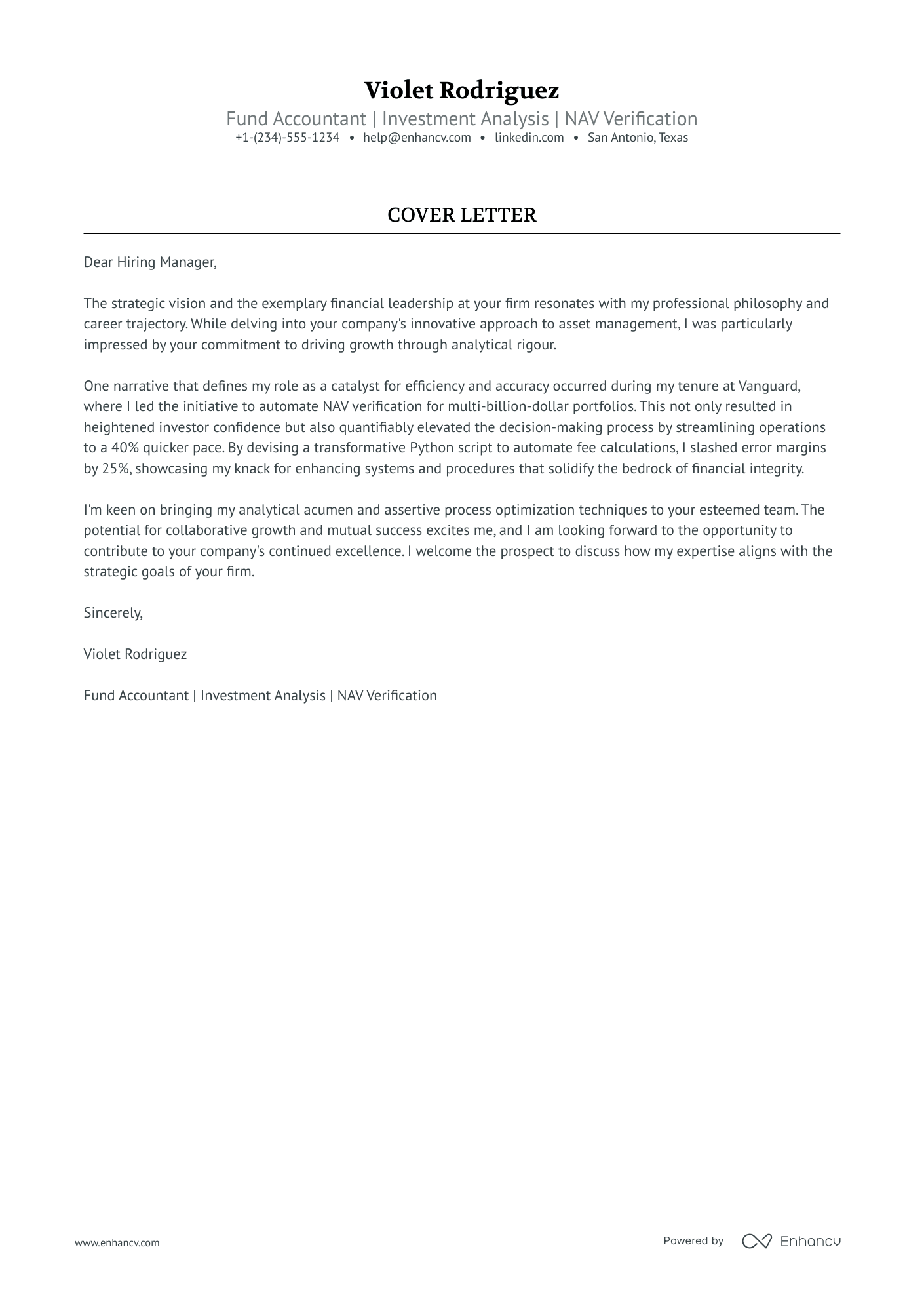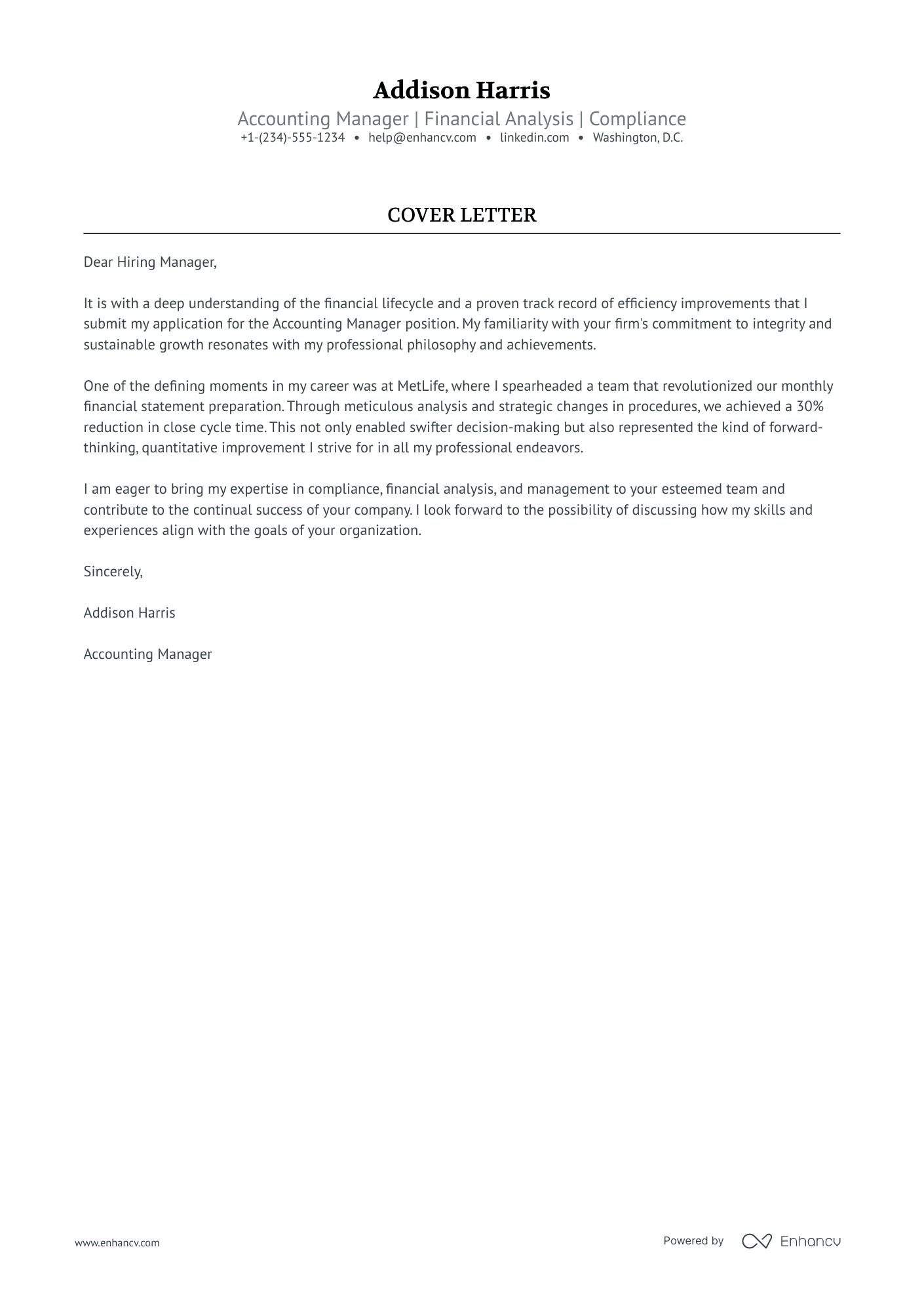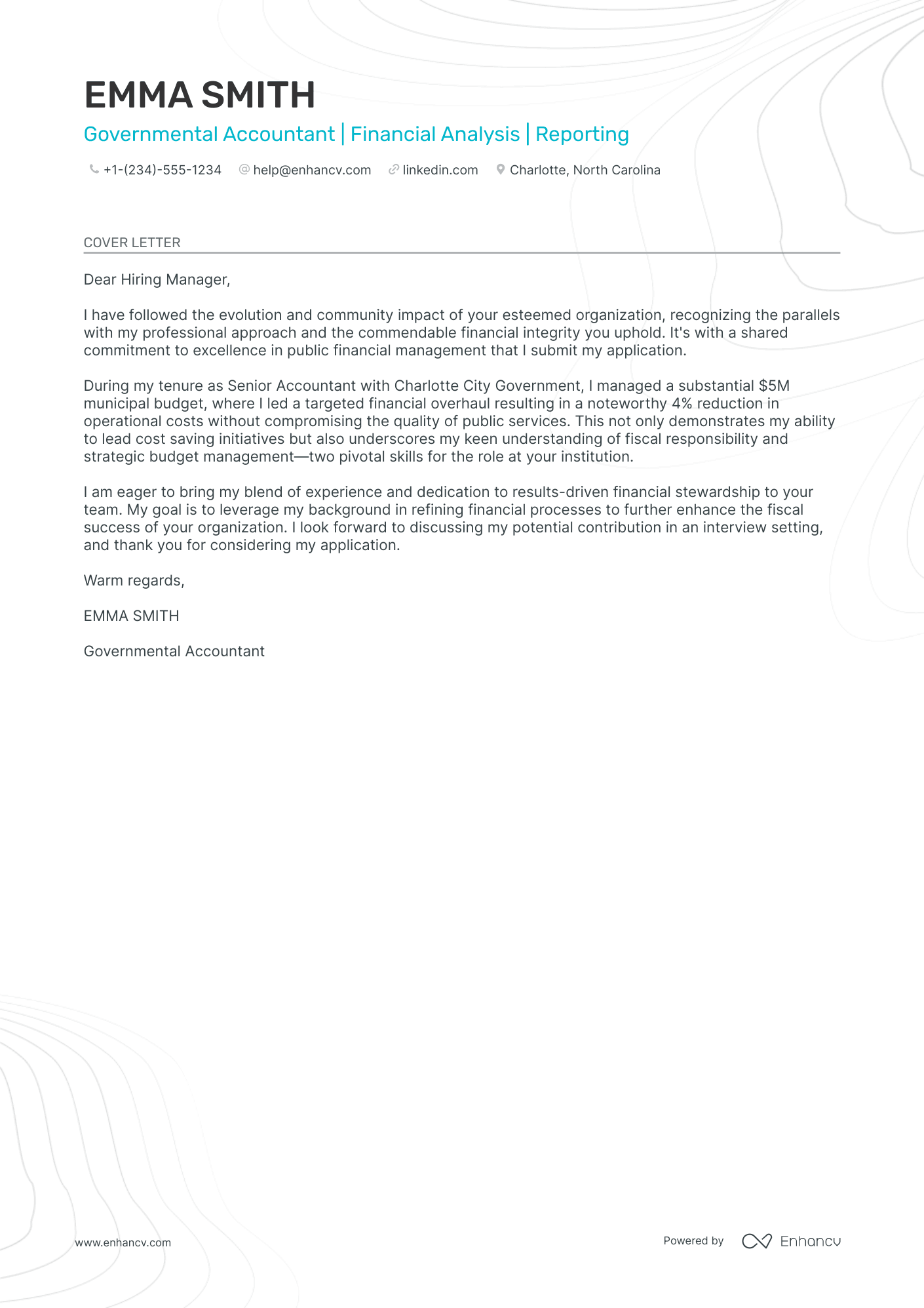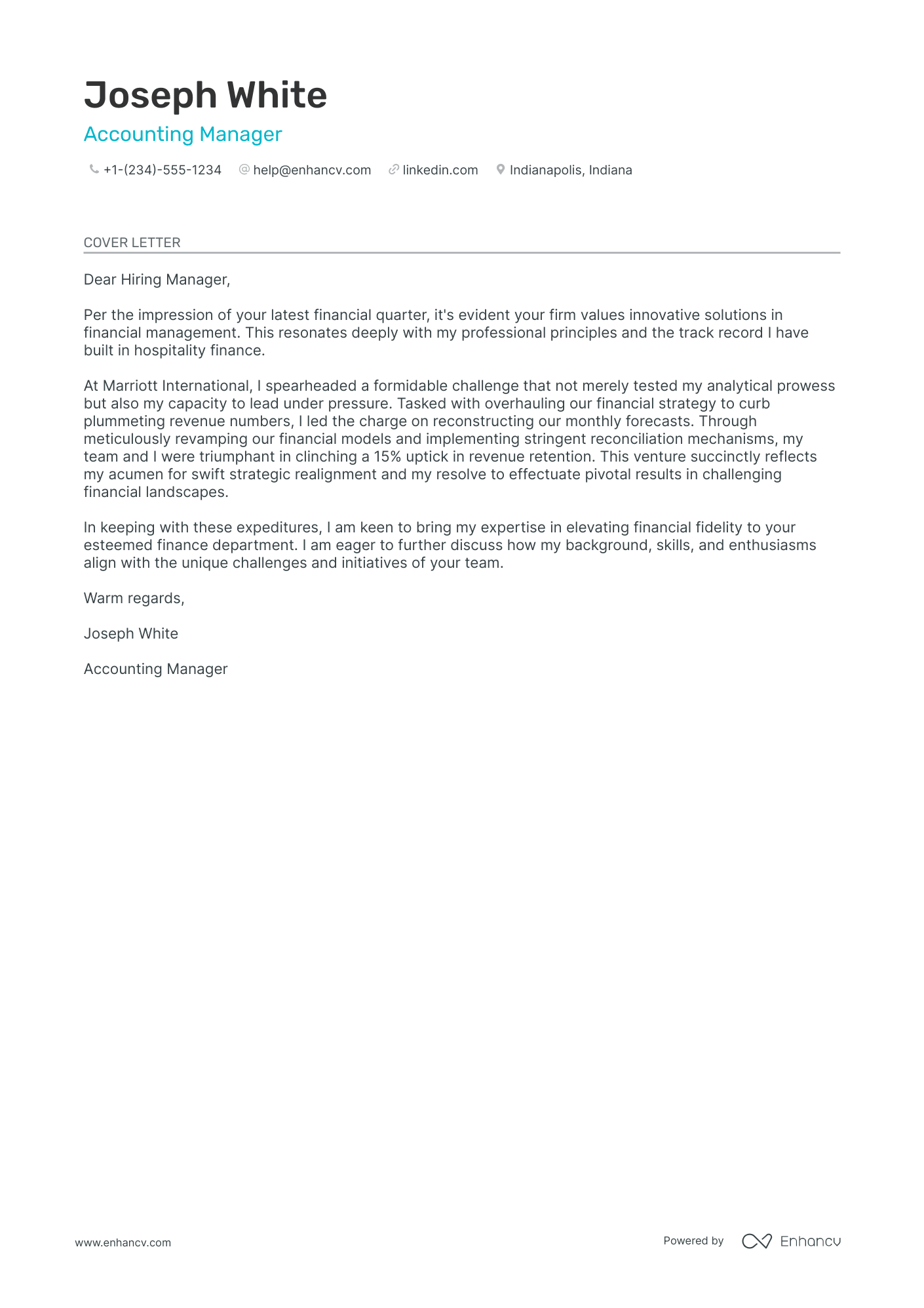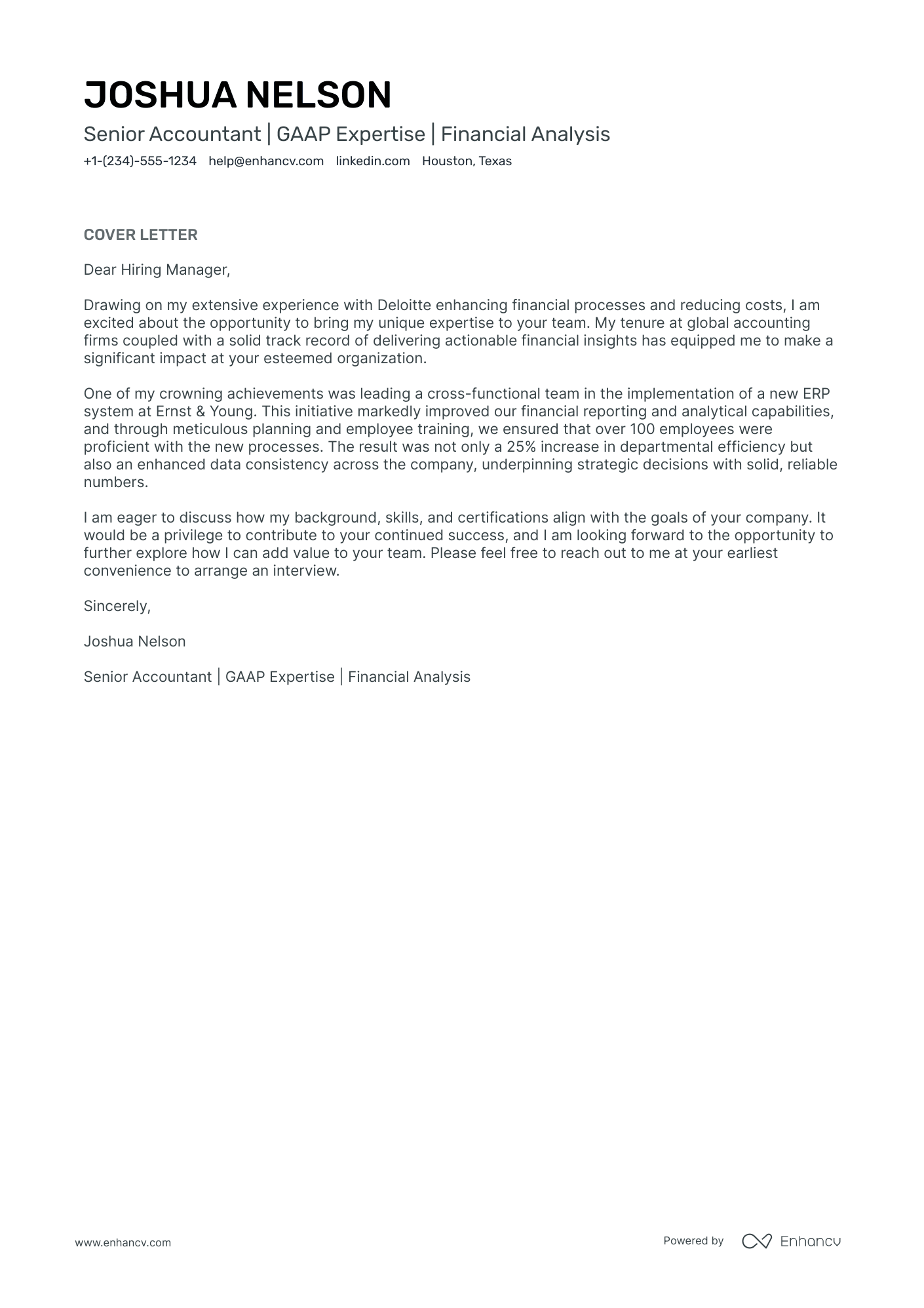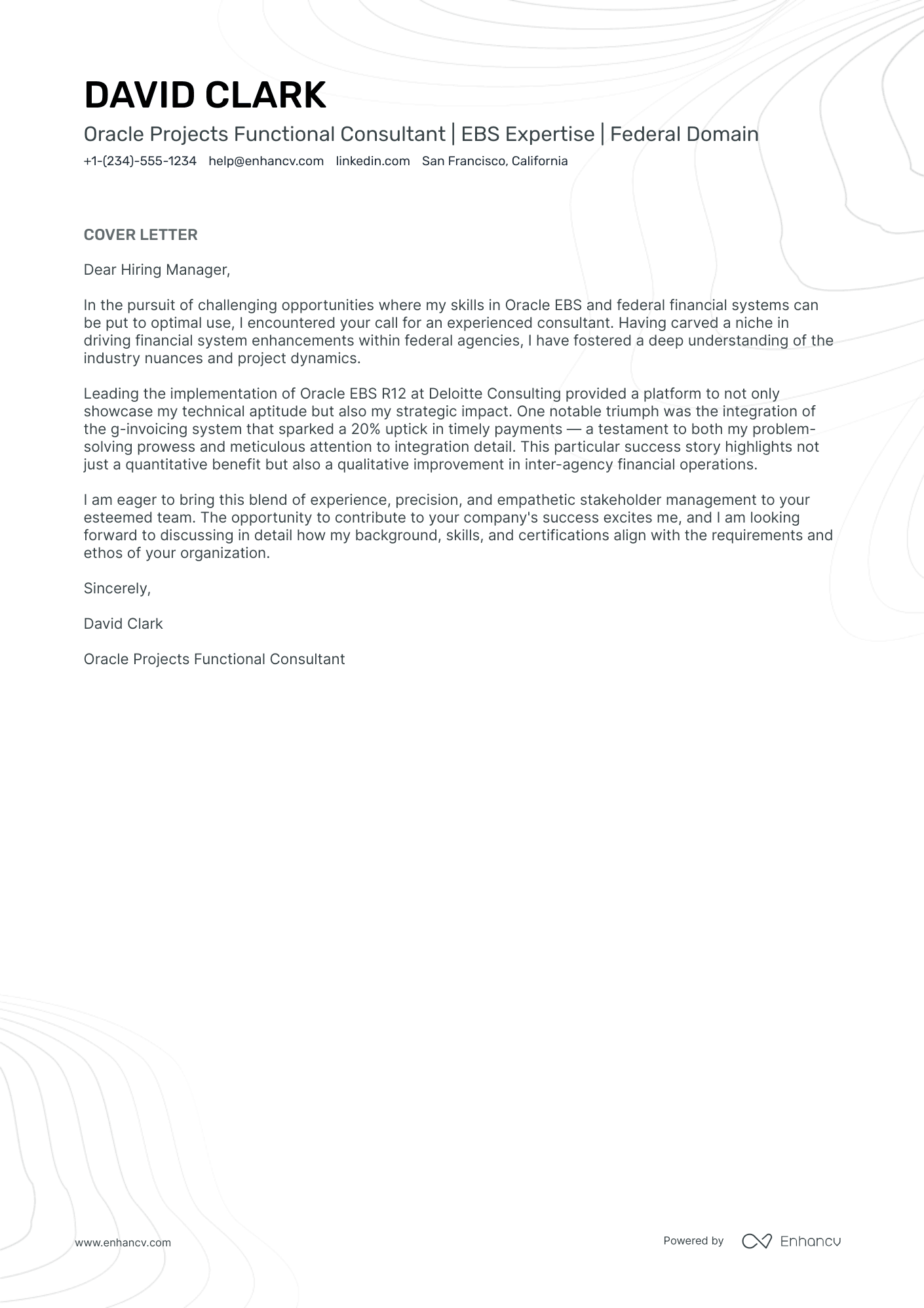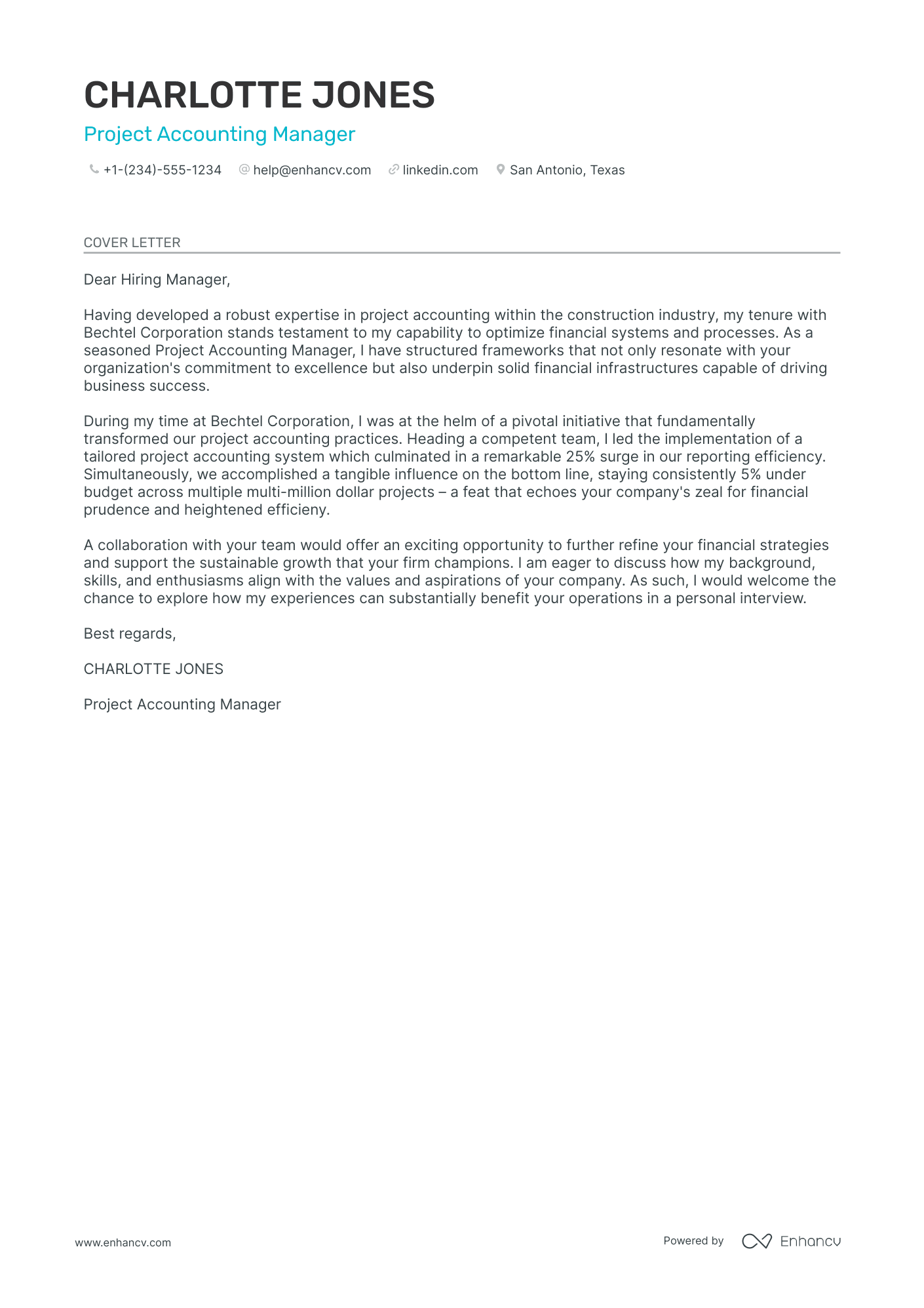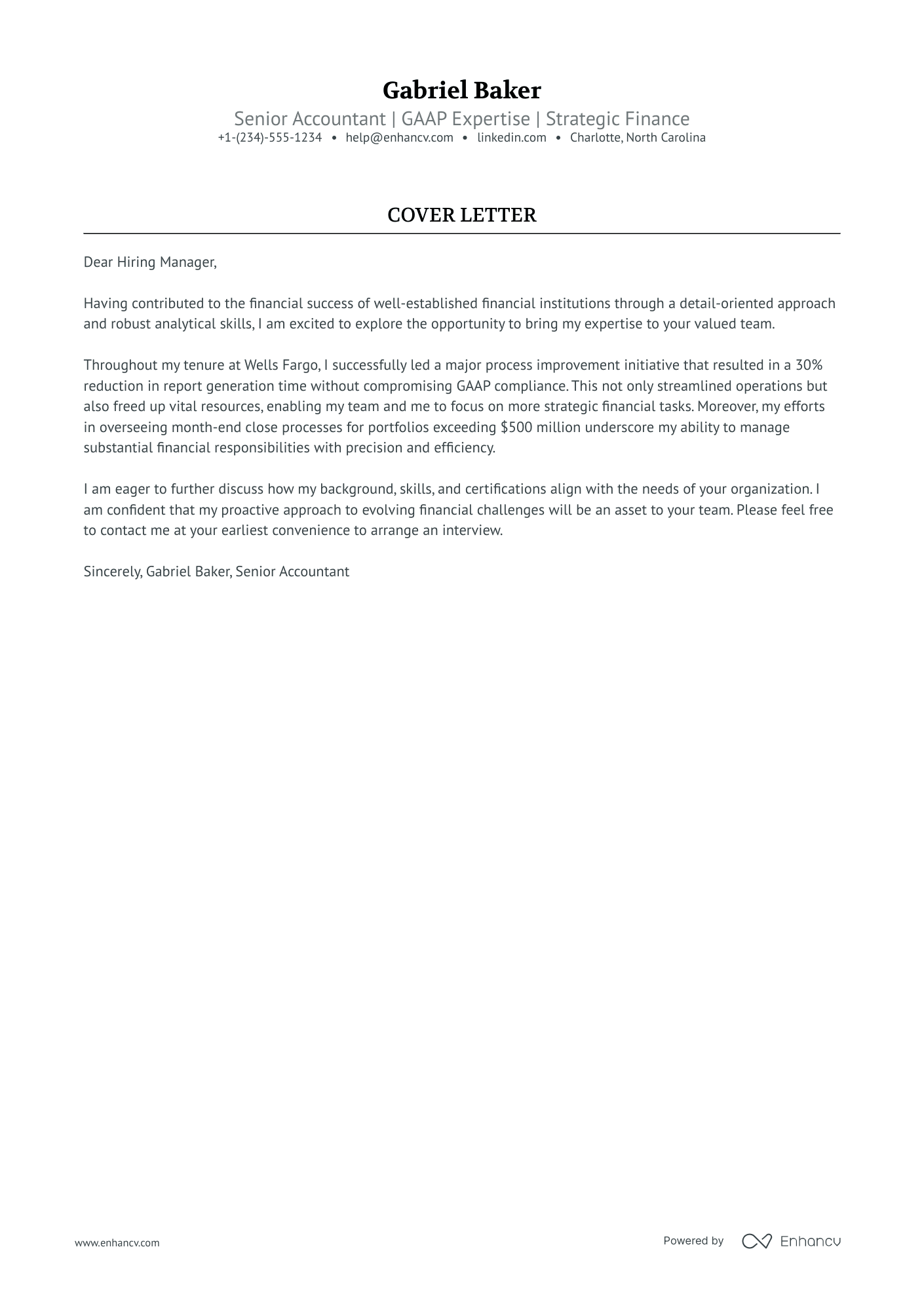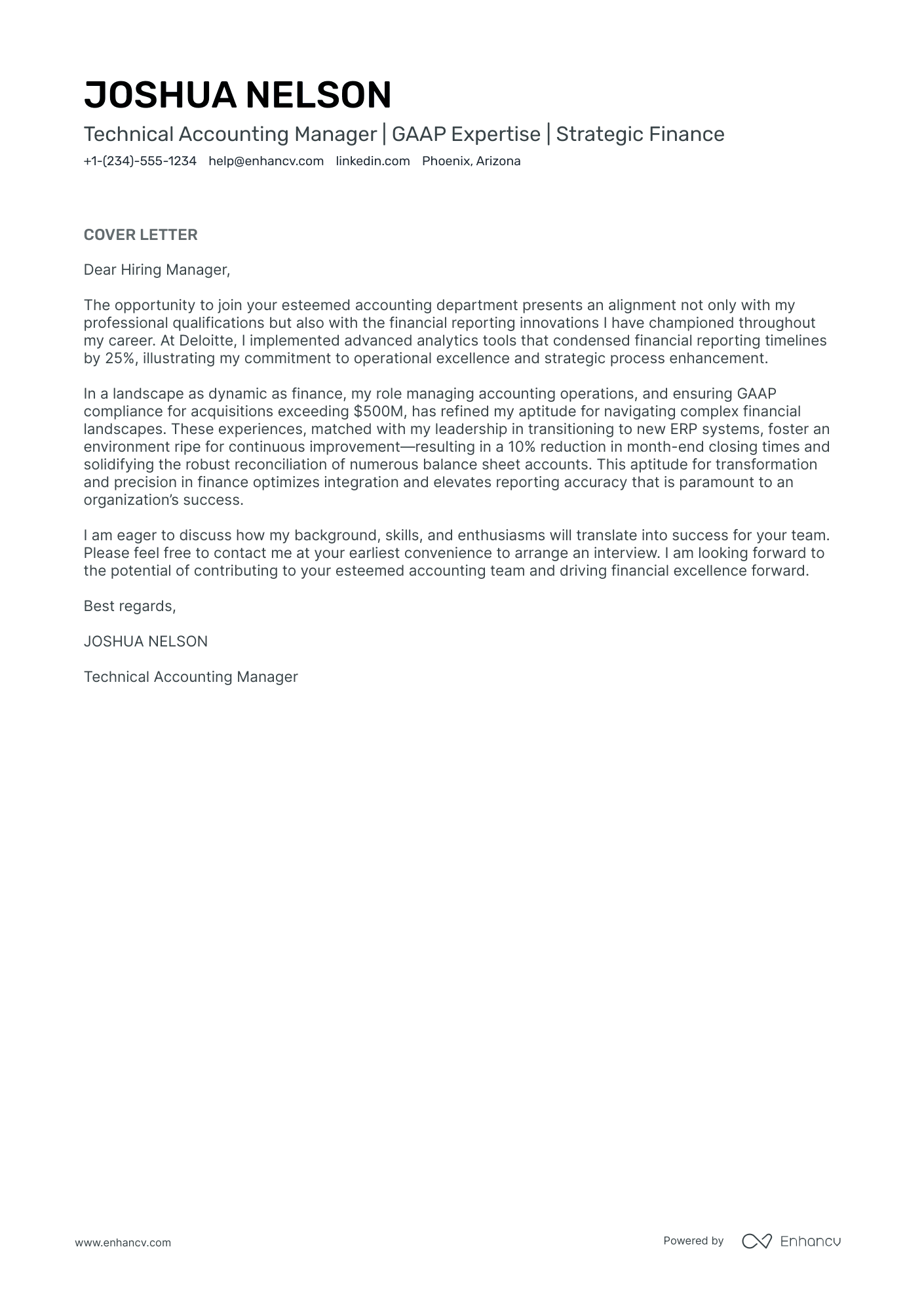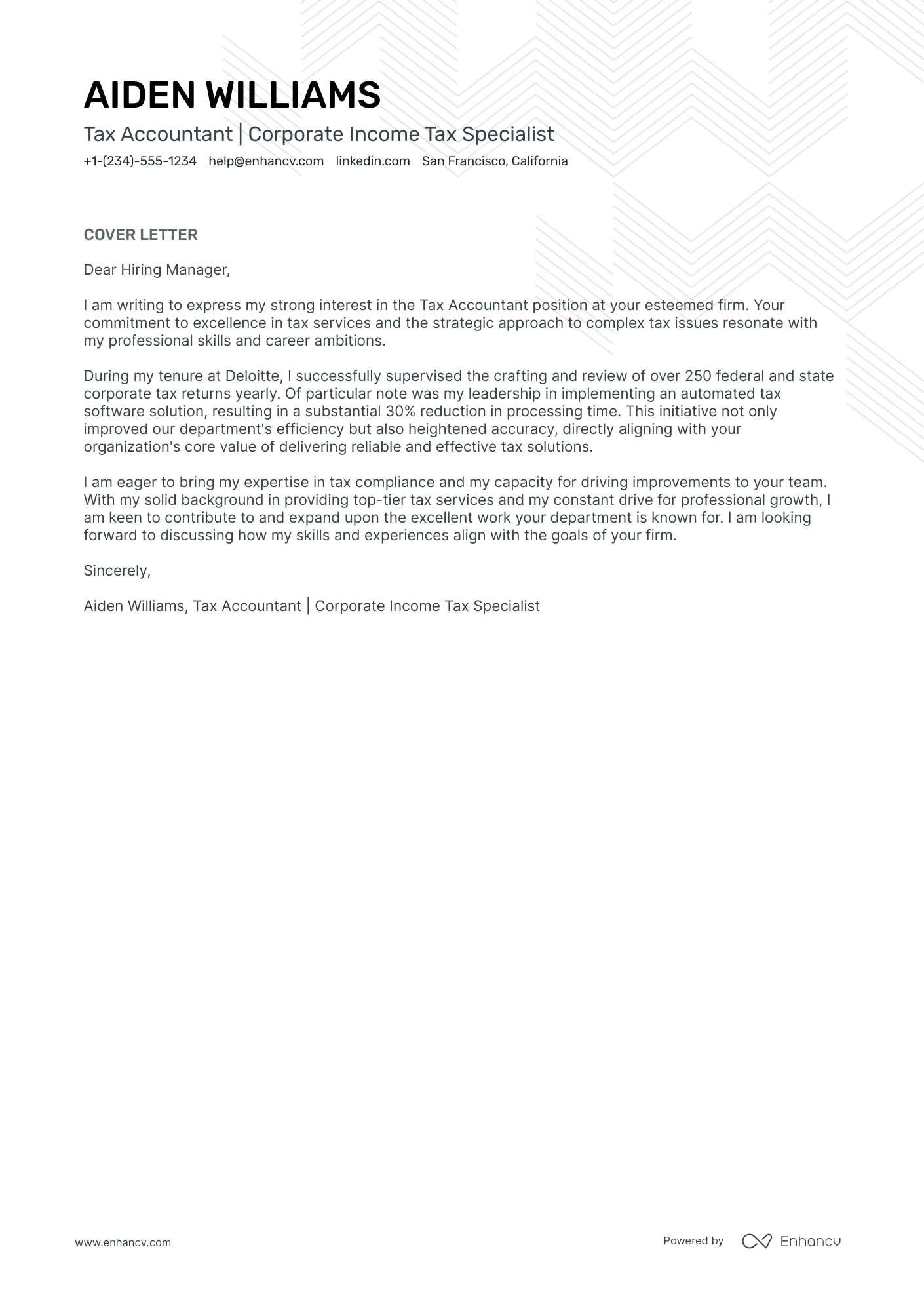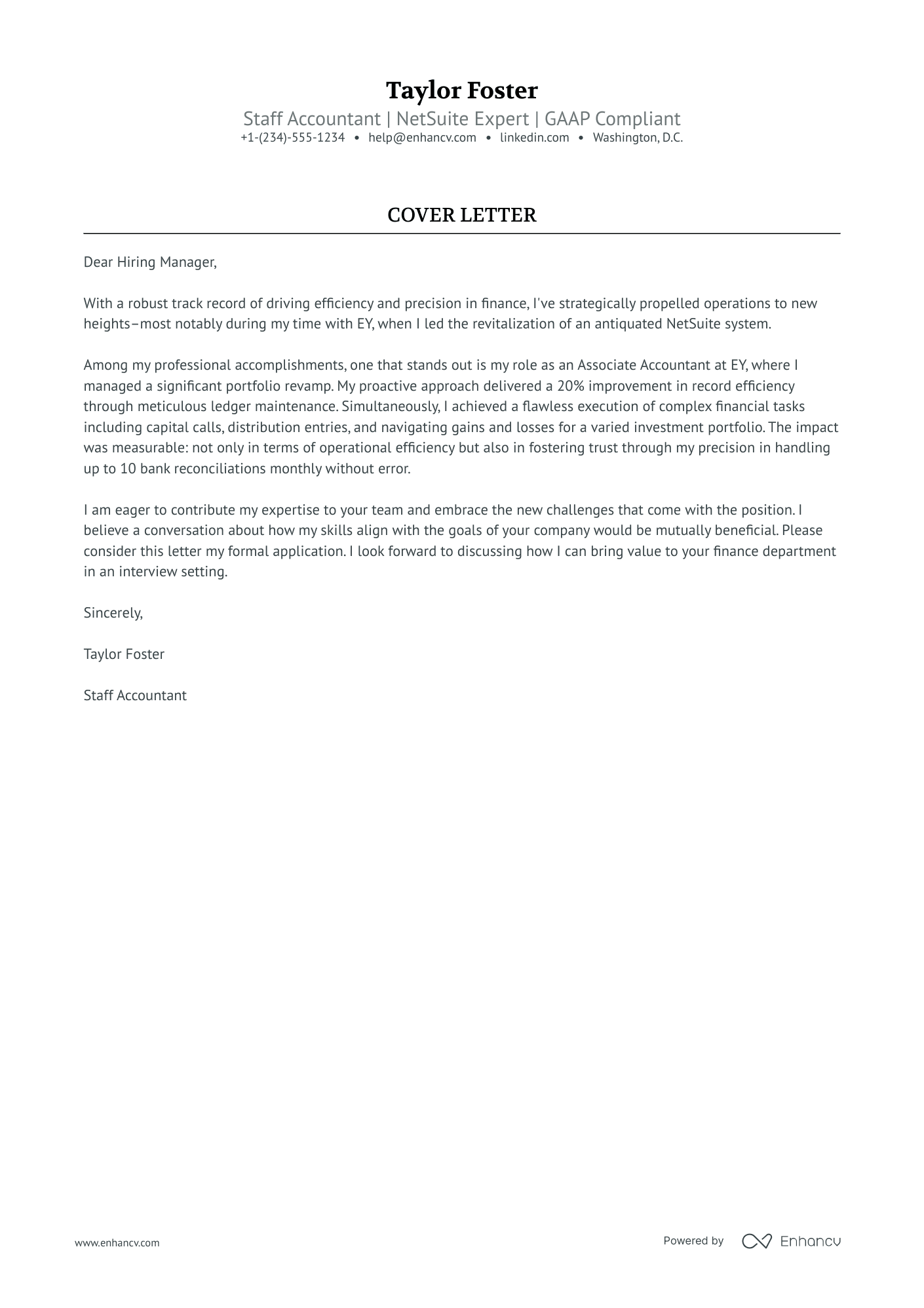Embarking on your job hunt, you've likely discovered that an accountant cover letter is a must-submit piece alongside your resume. It's not just a repeat of your credentials; your cover letter is the stage for your proudest professional moment, woven into a compelling story that captivates hiring managers. Keep it straightforward and free from overused phrases, ensuring it's concise enough to fit on a single page. Let's tackle the common pitfalls and craft a letter that balances professionalism with personality.
- Create a accountant cover letter to persuade the recruiters you're the best candidate for the role;
- Use industry-leading accountant cover letter templates and examples to save time;
- Dedicate your accountant cover letter space to your best achievement;
- Make sure your accountant cover letter meets recruiters' expectations and standards.
Avoid starting at the blank page for hours by using Enhancv's AI - just upload your resume and your accountant cover letter will be ready for you to (tweak and) submit for your dream job.
If the accountant isn't exactly the one you're looking for we have a plethora of cover letter examples for jobs like this one:
- Accounting resume guide and example
- Financial Analyst cover letter example
- Construction Accounting cover letter example
- Purchase Manager cover letter example
- Bank Teller cover letter example
- Financial Representative cover letter example
- General Ledger Accounting cover letter example
- Night Auditor cover letter example
- Finance Specialist cover letter example
- Tax Director cover letter example
- Public Accounting Auditor cover letter example
Accountant cover letter example
Charlotte May
Seoul, South Korea
+1-(234)-555-1234
help@enhancv.com
- Alignment with Organizational Goals: The cover letter does an excellent job of aligning the candidate's experience and success with the organization's objectives, demonstrating an understanding of the company's needs and how their skills can contribute meaningfully.
- Quantifiable Achievements: Including specific metrics, such as reduced processing time by 30% or saving $500,000 dollars, helps to quantitatively demonstrate the impact of the candidate's actions in previous roles—providing tangible proof of their capabilities and successes.
- Relevant Past Experience: Highlighting roles at reputable companies like Samsung Electronics and LG Electronics can reassure the hiring manager of the candidate's experience in significant environments and the professional level of their competencies.
- Call to Action: Closing the letter with an invitation to contact the applicant for an interview is a proactive step that simultaneously respects the hiring manager's time and demonstrates the candidate's eagerness to move forward in the application process.
The must-have sections and format of your accountant cover letter
When writing your accountant cover letter, keep in mind that it'll only be read by the recruiters and not the Applicant Tracker System (or software used to assess your profile). That's why you should structure your content with a/an:
- Header (apart from your contact information, include your name, the role you're applying for, and the date);
- Personalized salutation;
- Opening paragraph to win the recruiters over;
- Middle paragraph with key details;
- Closing that starts from clichés;
- Sign off (that's not mandatory).
Industry standards dictate your paragraphs to be single-spaced and to wrap your content in a one-inch margin. Designing your accountant cover letter, refer to one of our templates, which automatically takes care of the spacing and margins.
Choose the same font for your accountant cover letter as you did for your resume: the likes of Lato and Bitter would help you to stand out in a sea of cover letters in Arial or Times New Roman.
Export your whole accountant cover letter from our builder in PDF to keep the same formatting and image quality.
The top sections on a accountant cover letter
- Header: Include your contact information and the date, ensuring the recruiter can easily reach out to you after being impressed by your accounting qualifications and experience.
- Greeting: Address the recruiter or hiring manager by name if possible, to personalize your cover letter and demonstrate that you have done your research on the company.
- Introduction: Clearly state the accounting position you are applying for and give a succinct overview of your qualifications that matches the job requirements, showcasing your attention to detail which is crucial for an accountant.
- Body: Elaborate on your relevant accounting experience, certifications (like CPA), technical skills (such as proficiency in accounting software), and accomplishments with specific figures and examples that quantify your success, which is a key aspect that recruiters look for in accountants.
- Closing: Finish by reiterating your enthusiasm for the role, the value you can bring to the company with your accounting expertise, and a call to action, such as requesting an interview to discuss your fit for the position in more detail.
Key qualities recruiters search for in a candidate’s cover letter
- Attention to detail: Crucial for reviewing financial records and ensuring the accuracy of financial documents.
- Analytical skills: Necessary for interpreting financial data and making recommendations based on financial analysis.
- Proficiency with accounting software: Essential for the efficient handling of accounting tasks and staying current with technology trends in the field.
- Understanding of accounting principles and regulations: Important to ensure compliance with financial laws and generally accepted accounting practices.
- Communication skills: Required for effectively conveying financial information to non-accountants and collaborating with team members.
- Time management and organization: Vital for meeting financial deadlines, managing multiple clients or projects, and maintaining orderly financial records.
What greeting should you use in your accountant cover letter salutation
A simple "Hello" or "Hey" just won't work.
With your accountant cover letter salutation, you set the tone of the whole communication.
You should thus address the hiring managers by using their first (or last name) in your greeting.
But how do you find out who's recruiting for the role?
The easiest way is to look up the role on LinkedIn or the corporate website.
Alternatively, you could also contact the organization via social media or email, for more information.
Unable to still obtain the recruiter's name?
Don't go down the "To whom it may concern path". Instead, start your cover letter with a "Dear HR team".
List of salutations you can use
- Dear Hiring Manager,
- Dear [Name of the Hiring Manager],
- Dear [Department] Manager,
- Dear [Mr./Ms. Last Name],
- Dear [Company Name] Recruiter,
- Dear [Company Name] Team,
Your accountant cover letter introduction and the value you bring
Moving on from the "Dear Recruiter" to your professional introduction.
Use those first two sentences of your accountant cover letter to present the biggest asset you'd bring to the organization.
Don't go into too much detail about your achievement or the skill set, but instead - go straight for the win.
That is - what is your value as a professional?
Would you be able to build stronger, professional relationships in any type of communication? Or, potentially, integrate seamlessly into the team?
Choosing your best achievement for the middle or body of your accountant cover letter
Now that you have the recruiters' attention, it's time to write the chunkiest bit of your accountant cover letter.
The body consists of three to six paragraphs that focus on one of your achievements.
Use your past success to tell a story of how you obtained your most job-crucial skills and know-how (make sure to back these up with tangible metrics).
Another excellent idea for your accountant cover letter's middle paragraphs is to shine a light on your unique professional value.
Write consistently and make sure to present information that is relevant to the role.
Thinking about the closing paragraph of your accountant cover letter
Before your signature, you have extra space to close off your accountant cover letter.
Use it to either make a promise or look to the future.
Remind recruiters how invaluable of a candidate you are by showing what you plan to achieve in the role.
Also, note your availability for a potential next meeting (in person or over the telephone).
By showing recruiters that you're thinking about the future, you'd come off as both interested in the opportunity and responsible.
Is it beneficial to mention that you have no experience in your accountant cover letter?
Lacking professional experience isn't the end of the world for your accountant cover letter.
Just be honest that you may not have had roles in the industry, but bring about so much more.
Like, your transferable skills, attained thanks to your whole work and life experience (e.g. the skills your summer spent working abroad taught you).
Or, focus on what makes you, you, and that one past success that can help you stand out and impress recruiters (think of awards you've attained and how they've helped you become a better professional).
Alternatively, write about your passion and drive to land the job and the unique skill set you would bring to enhance the workplace culture.
Key takeaways
Writing your accountant cover letter has never been easier, so remember to:
- Select a accountant cover letter template that automatically meets industry formatting (e.g. has one-inch margins, is single-spaced, is in PDF, etc.);
- Make your accountant cover letter personal by mentioning the recruiters' first or last name;
- Within the introduction, describe what you like best about the company in no more than two sentences;
- Use your accountant cover letter body to tell a story of your greatest achievement, backed up by job-relevant skills and technologies;
- If you have no professional experience, be honest about it in your accountant cover letter, but also write about your unique talents.
Accountant cover letter examples
Explore additional accountant cover letter samples and guides and see what works for your level of experience or role.
By Experience
Accounting Intern
Senior Accountant
Senior Tax Accountant
Entry-Level Accountant
Junior Cost Accountant
By Role
